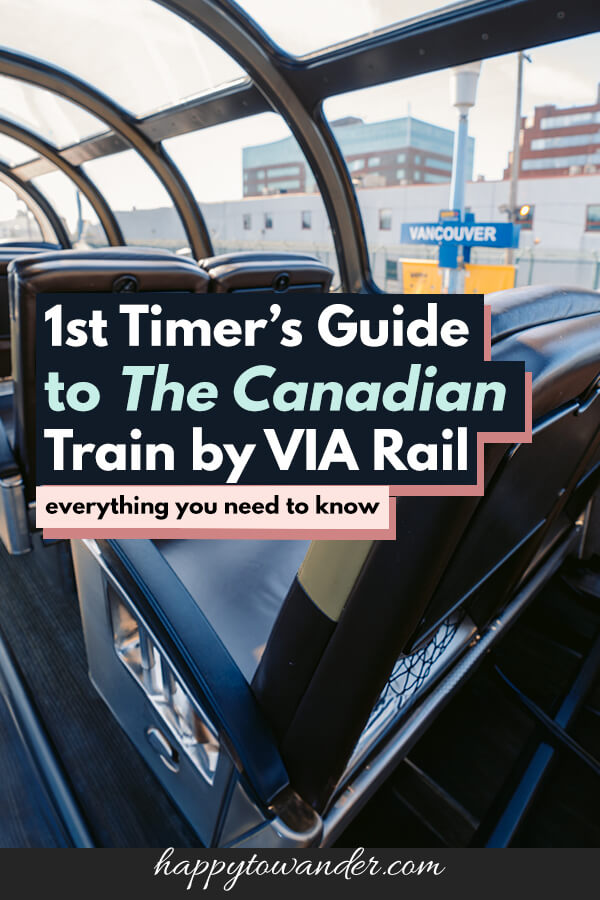*FYI - this post may contain affiliate links, which means we earn a commission at no extra cost to you if you purchase from them. Also, as an Amazon Associate I earn from qualifying purchases. Check out our Privacy Policy and Disclosure. for more info.
Topping bucket lists of train nerds around the world, the four day train journey between Vancouver and Toronto (on board the aptly named ‘Canadian’) is a truly once in a lifetime experience.
Along the way, you pass snow-topped mountains and turquoise lakes in the West, idyllic Windows screensaver-esque fields in the Prairies, and an endless parade of lakes and trees in Ontario. Sounds pretty dreamy, no?
It is… but it’s also a journey plagued with delays, high price tags, and a lack of WiFi. In other words, it’s not perfect, but having now travelled on the Canadian twice (once from Vancouver to Toronto, with stopovers along the way and then again from Vancouver to Jasper), I feel ready to give you an honest take on everything you need to know before riding the world-famous ‘Canadian’ train by VIA Rail.
So, from fare class comparisons and tricks to save money, all the way to extra tips on what to bring to survive the journey, this detailed post will share everything you need to know about the VIA Rail Canadian. I hope you find it helpful!
NOTE: I’ve technically been on the Canadian a third time, but just on a day time media visit to capture photos of the different classes for this article. So yes, if you’re wondering how I have such crisp, people-free photos from every class of the Canadian, it’s because I got a private tour while the train was between trips in Vancouver 🙂 Every trip I’ve done though I’ve paid for out of pocket!
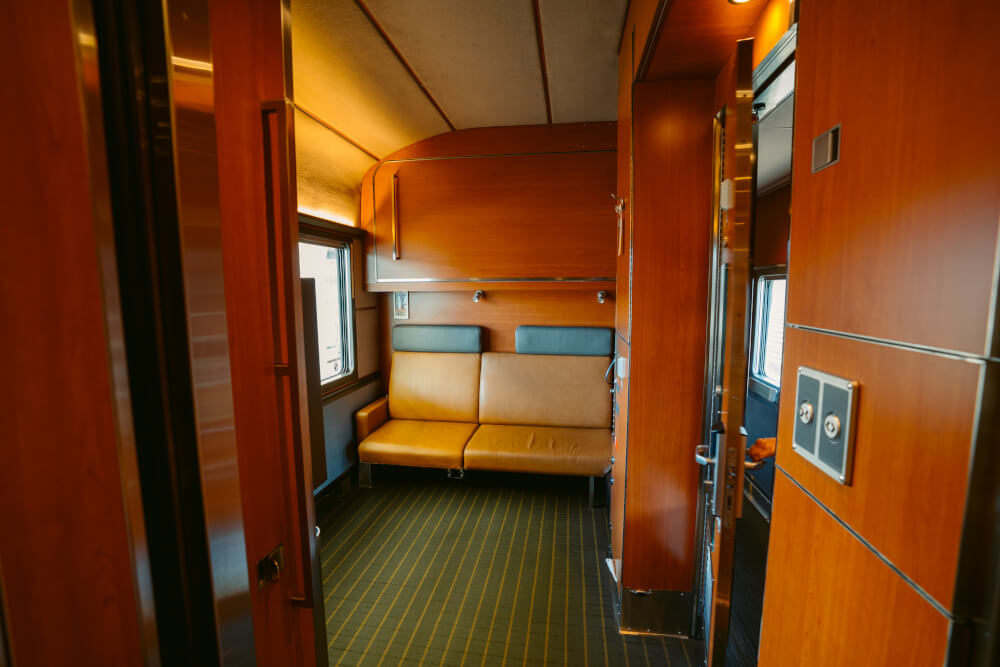
The Canadian Train: A Brief Introduction
So, what exactly is ‘the Canadian’? Today, it is a legendary train operated by VIA Rail that links Pacific Central Station in Vancouver with Union Station in Toronto.
Historically though, the name ‘the Canadian’ actually dates back to 1955, when Canada Pacific (CP) first introduced a transcontinental train between Montréal and Vancouver, and gave it ‘the Canadian’ name. When VIA Rail acquired the service over two decades later, they decided to keep the name as-is, and we continue to use it today.
Spanning 4466 kilometres, the journey takes 4 days and 4 nights, though often longer due to the notorious delays that plague passenger rail in Canada.
Long story short: freight trains in Canada take priority as CN (a freight train company) owns most of the rail mileage in the country… meaning anytime a freight train comes, VIA Rail’s trains have to pull over and let them pass… a very frustrating experience that can happen even within minutes of leaving the station!
Over the course of almost 4500km, this can stack up to days of delays, which naturally isn’t the best for people with a tight schedule… but this is by far the most scenic way to travel across the country, and a unique experience that’s honestly unforgettable if you know what to expect.
So, let’s get you properly initiated! For starters, the Canadian stops at the following stations:
- Vancouver, BC
- Kamloops, BC
- Jasper, AB
- Edmonton, AB
- Saskatoon, SK
- Winnipeg, MB
- Sioux Lookout, MB
- Sudbury Junction, ON
- Toronto, ON
NOTE: For those interested in travelling across Canada from coast to coast, you can continue the journey by hopping on a train from Toronto to Montréal, then getting on the Ocean, which takes you from Montréal to Halifax.
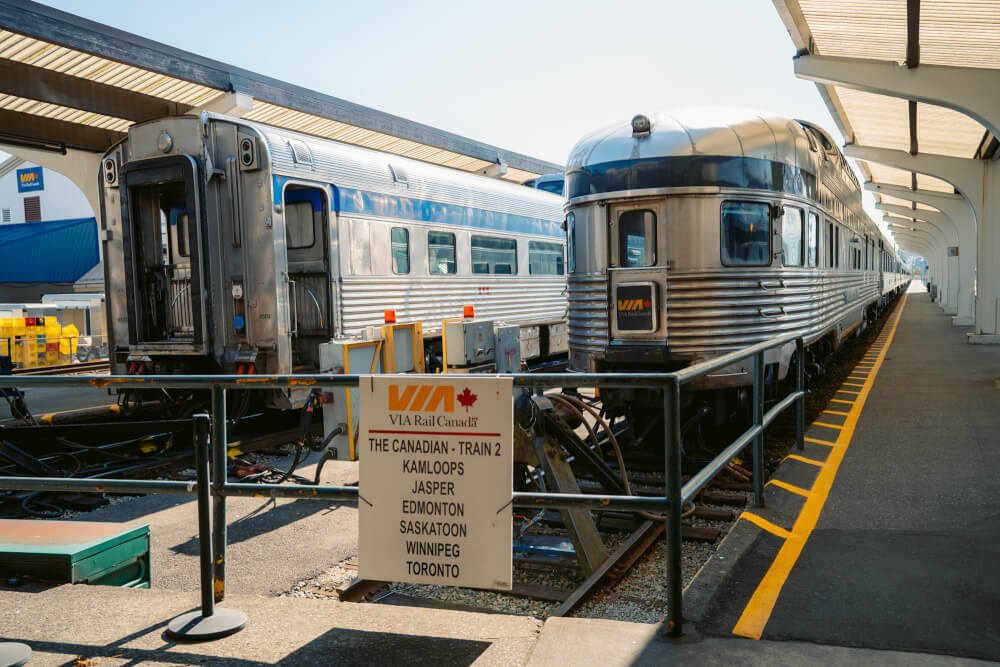
Eastbound, The Canadian starts its journey in Vancouver.
Westbound, The Canadian starts its journey in Toronto.
It is of course also possible to board the Canadian at the stops in-between these two cities, e.g. Kamloops, Jasper, Edmonton, Saskatoon, Winnipeg, or Sudbury Junction, or hop on/off as I did, spending a few days in each city (so long as you book the journeys individually).
All that said, I highly, highly recommend you start your journey in either Vancouver or Toronto, simply because delays make arrival times partway through the route completely unpredictable, like that time I waited a solid six hours at Saskatoon station for my train, only to arrive in Winnipeg 13 hours later than expected.
The other consideration to keep in mind is that the stretch between Vancouver and Jasper is commonly considered the most beautiful part of the journey. I’ve heard that the westbound journey in this sense is more enjoyable because you get to save the most scenic parts for last, and you also get to see more of the trip in daylight… though beware that delays can mess with this a bit sometimes too!
Either way, whichever direction you take it, there will be great views, so don’t stress too much.
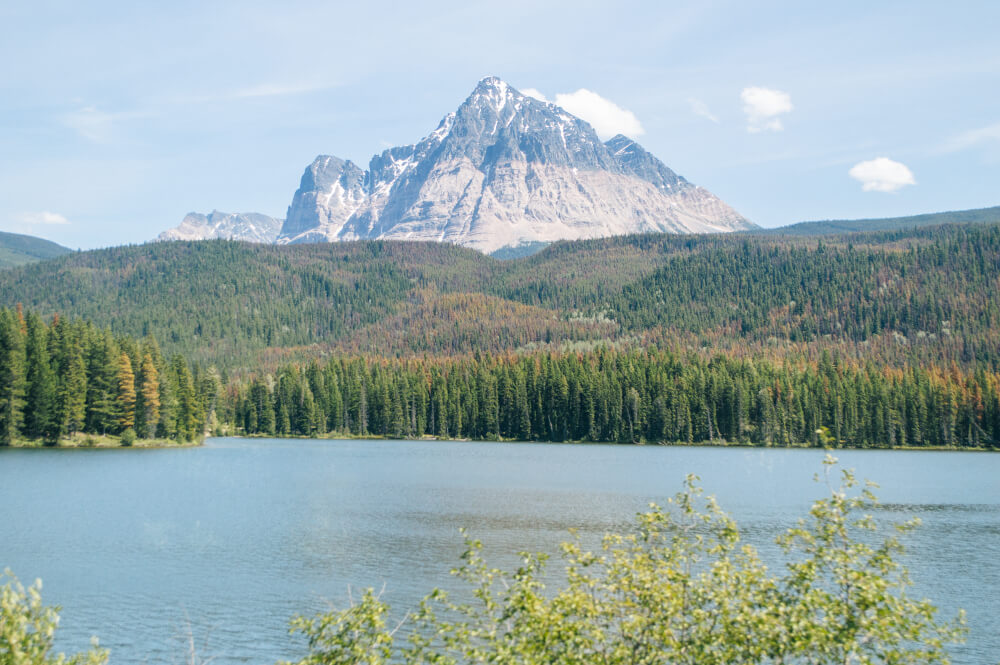
Economy vs. Sleeper Plus vs. Prestige Class on the Canadian
Now, the most important discussion: what class to book on the Canadian! This can make a huge difference in your experience on board.
Broadly speaking, there are three different classes that you can book on board the Canadian: Economy, Sleeper Plus, and Prestige.
As you can expect, prices vary wildly between classes, and even within the Sleeper Plus class because there are a few different types of sleeping accommodation that you can book.
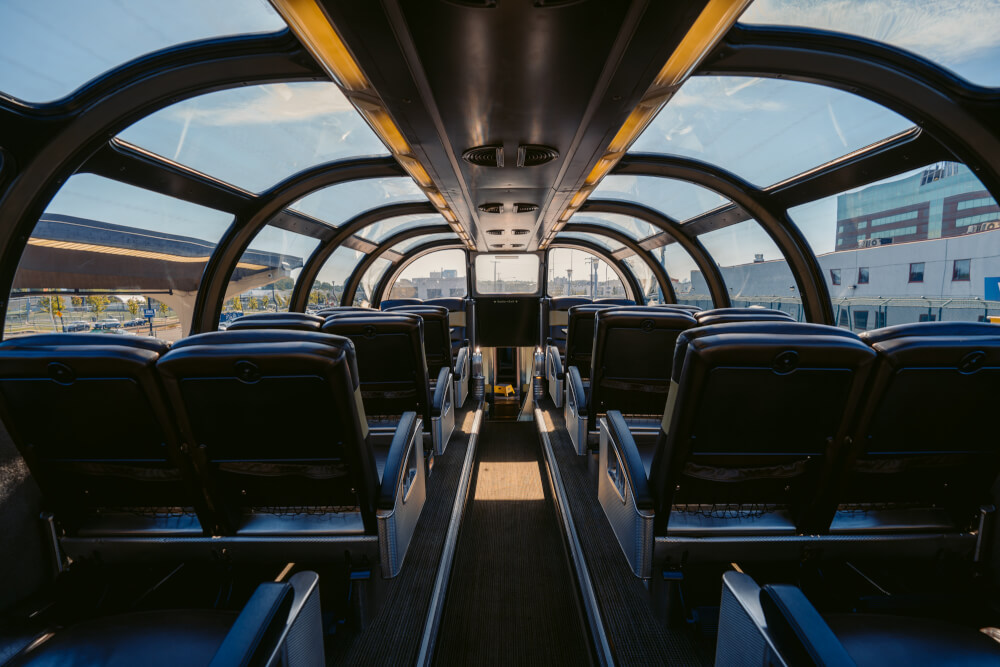
Here’s a little breakdown of what you can expect in each class!
Economy Class
Economy Class on board the Canadian means you won’t have access to a bed, but you will get to enjoy a pretty comfortable reclining seat with plenty of leg room, a fold down table, a pull out leg rest, and a power socket (which not even all Sleeper Plus fares have… so ha!)
Plus, Economy class passengers have access to a Skyline car, which has some light meals and snacks available for purchase, as well as a dome car up top that has some pretty gorgeous views.
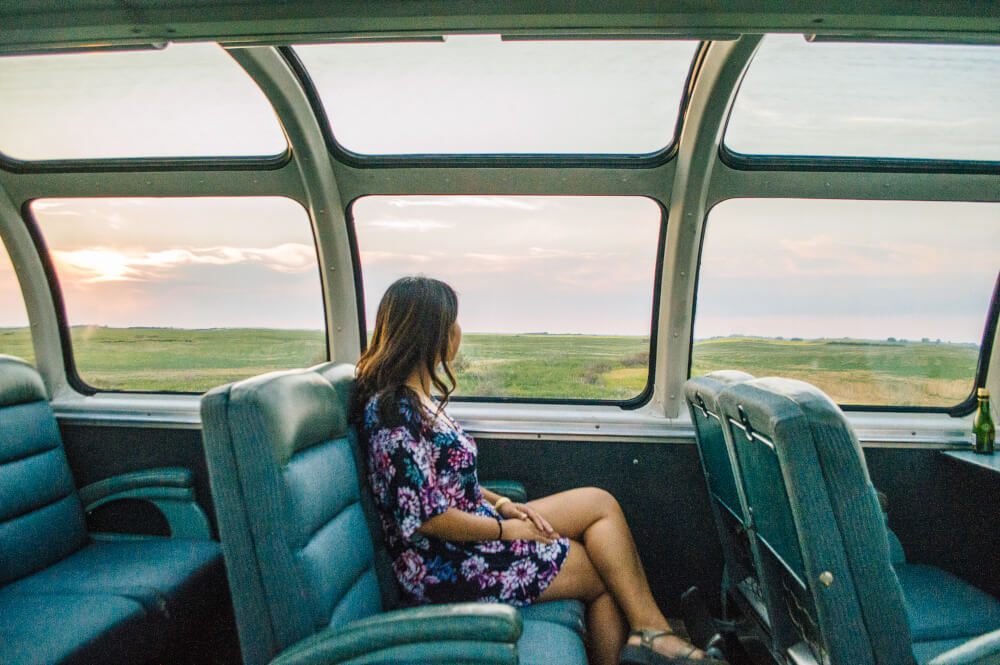
Both times on board the Canadian, I opted for Economy Class because well… the first time I was a broke recent grad, and the second time I was only going to Jasper, so didn’t feel the need to book a sleeper for such a short journey.
Given that I separated my Canadian journey by stopping at different cities along the way, I was never on the train for more than 30 hours, so I thought Economy class was fine, although a little uncomfortable at times.
I was also lucky in that the trains were never so full that I had to sit next to anyone, meaning I was free to spread out which made a world of difference. I can imagine sitting right next to someone for that entire journey wouldn’t be nearly as comfortable.
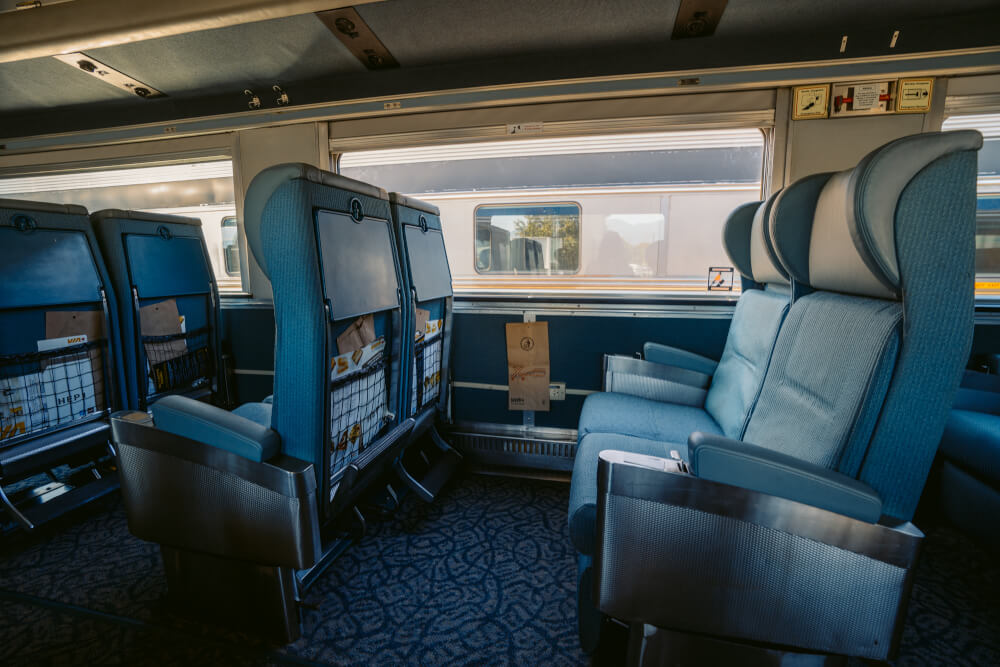
All that said, if you plan to take the Canadian the full way through non-stop between Vancouver and Toronto, I would recommend splurging a little and booking a Sleeper Plus fare (or a Prestige class if you’re rolling in it) because that would mean access to a bed, shower, proper meals, and a much comfier overall journey.
If however you are doing shorter journeys along the way, Economy isn’t bad, especially given the price, though the food definitely leaves something to be desired. I hope you like cup noodles & microwaved Mac and Cheese.
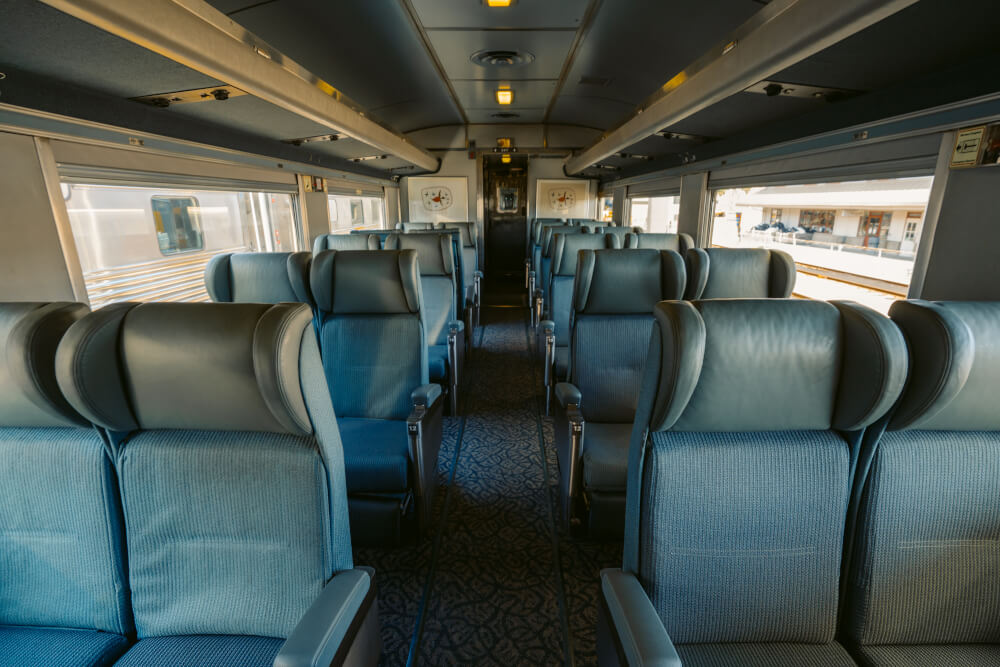
Sleeper Plus Class
Within Sleeper Plus Class, the main benefit is you get access to a bed! Whee!
Within this class, you can either book a berth (which means open plan seats that get converted into beds at night) or a cabin (self-contained rooms that have their own toilet and sink).
Berths are of course less private than cabins, but I’ve heard the communal experience is actually quite nice (assuming you get cool neighbours, I suppose).
On board the Canadian, Berth areas are made up of two seats that face each other during the day, then are pushed together to form the Lower Berth bed at night, while an Upper Berth bed folds out from the wall (like a makeshift top bunk).
There’s also a little curtain for privacy, if the thought of sleeping among strangers begins to spook you.
Berth passengers have access to both public washroom and shower facilities, though they do NOT have power outlets, so keep that in mind!
Here are some specs from the VIA Rail website for berth beds:
- Mattress size: approximately 5 ft. 10 in. x 3 ft. 7 in. (178 cm x 109 cm)
- Room from mattress to partition is 5 in. = 12.7 cm
- Foot end of mattress has 10 in. radius = 25.4 cm
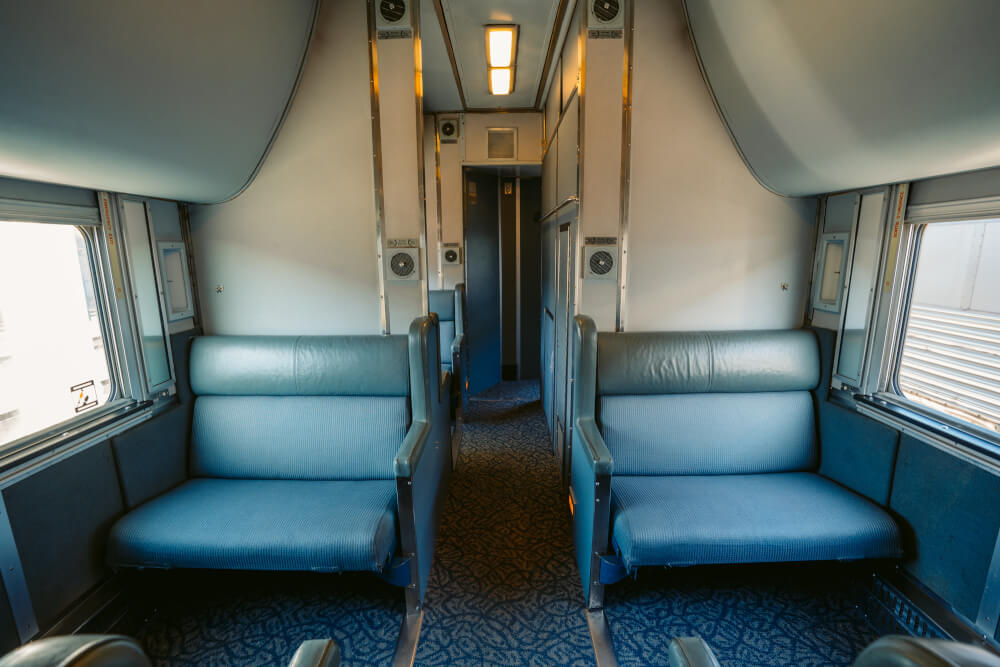
Cabins on the other hand come in sizes for one, two, three, and four.
A Cabin for One comes with its own private toilet and sink, but the specifics are less glamorous than they sound.
Basically your cabin will have a seat and toilet during the day (in the same room), then at night it is replaced by a bed that then covers said toilet. So yes, you do indeed sleep over your toilet but let’s not think about that too much!
Other amenities for in a Cabin for One include a mirror, fan, air conditioning, drinking water and towels, pillows, sheets and blankets, as well as a 110V AC outlet.
Here are some general specs from the VIA Rail website for Cabins for one:
- Room size: 6 ft 5 in x 3 ft 7 & 1/2 in (196 cm x 110 cm)
- Mattress size: 5 ft 11 in x 2 ft 7 in (180 cm x 80 cm)
- Room from mattress to partition when bed is down is 2 in (5 cm)
- Bed narrows down from 23 in (58 cm) wide to 14 in (36 cm) at the foot of bed
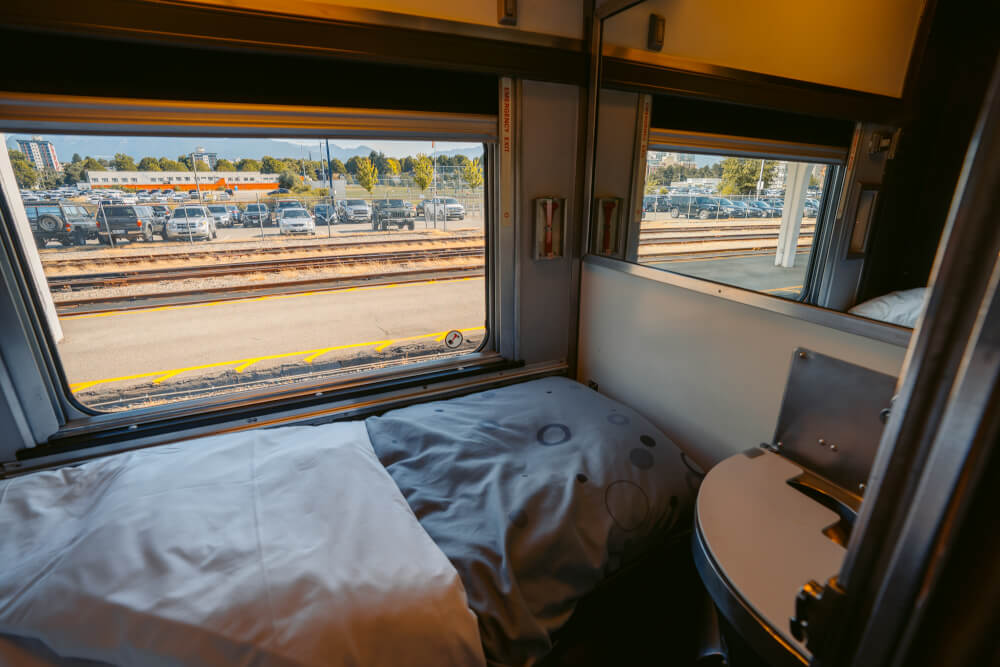
NOTE: There are supposedly two types of ‘cabins for one’: upper (which requires you to step up into the sleeping compartment from the main floor) and lower (which is on the same level as the rest of the sleeping car).
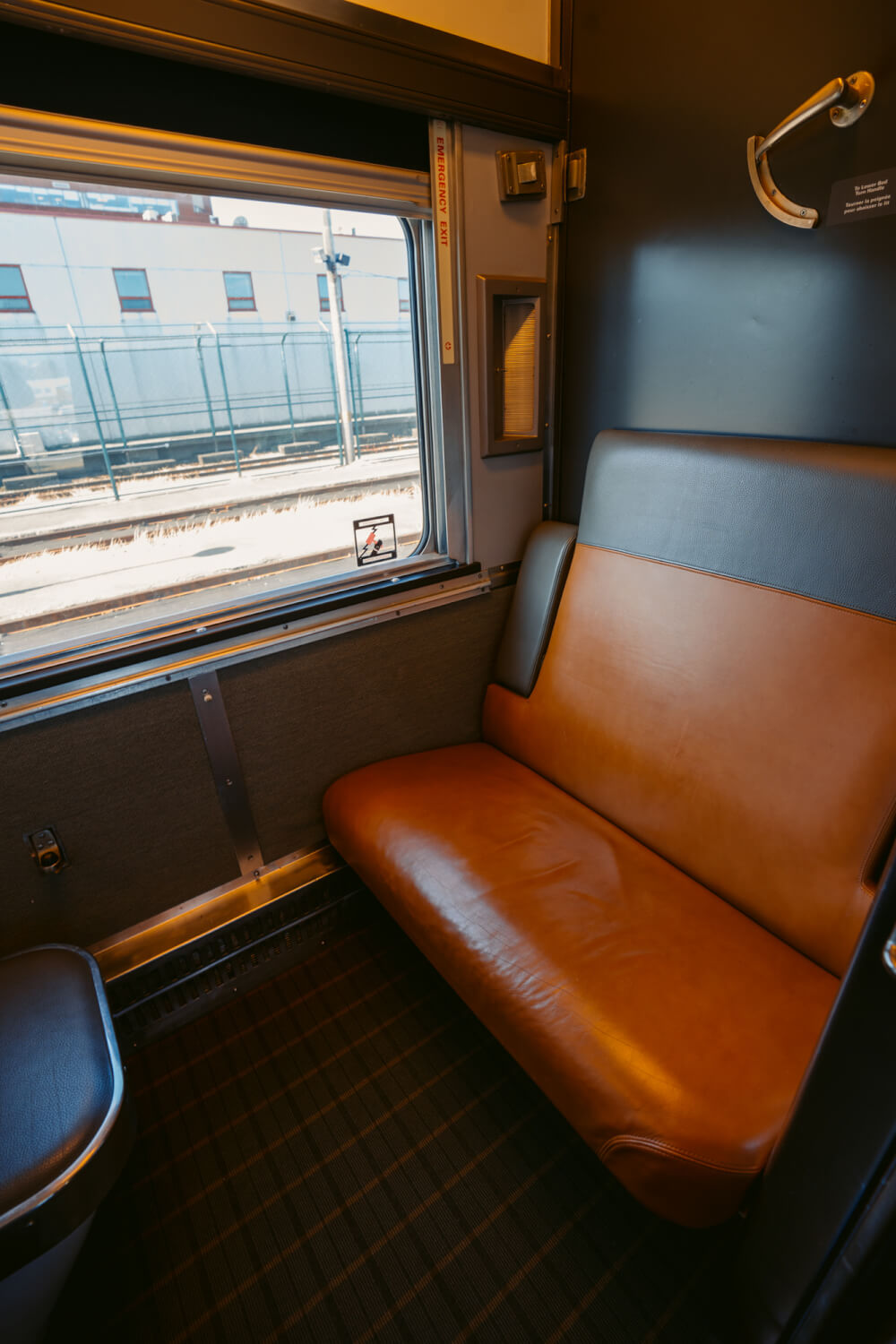
In a Cabin for Two, the setup and amenities are similar: you have two comfortable chairs during the day that are then converted into beds at night (bunk style, like in the berths).
Of course, you get all the same amenities as in the Cabin for One, plus some extra bonuses like a small closet in the cabins for two, and a toilet that’s actually in its own tiny ensuite so you don’t have to… sleep over where you pee like in the Cabin for one!
Here are some general specs from the VIA Rail website for Cabins for Two:
- Room size: 7 ft 3 in. X 5 ft (214 cm x 152 cm), excluding 2 ft 9 in x 2 ft 1 in (84 cm x 64 cm) for private washroom
- Mattress size: approximately 71 in x 31 in (180 cm x 79 cm) on Château and Manor cars
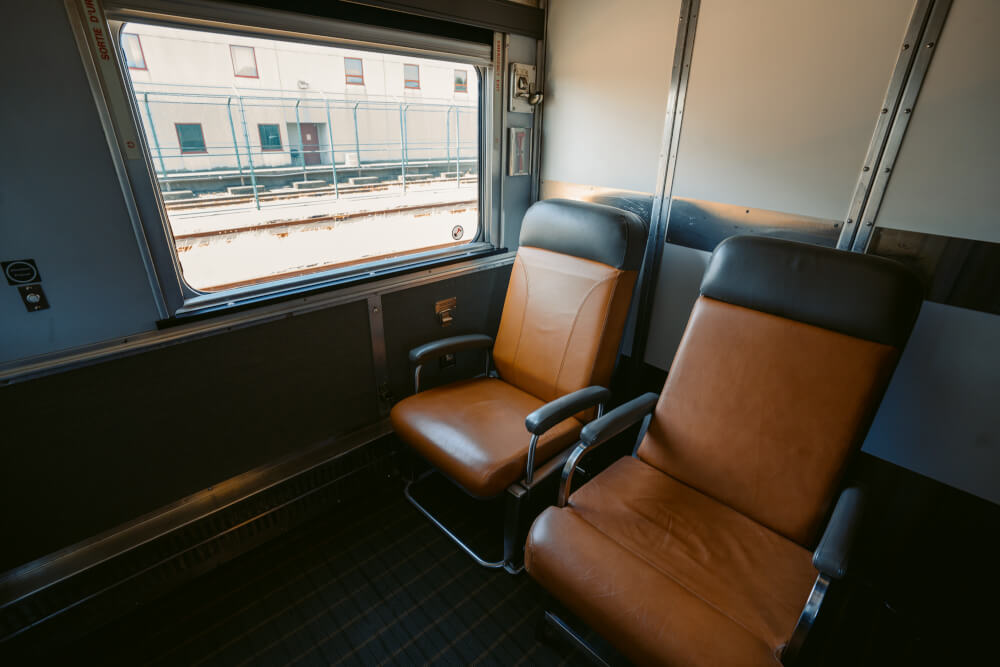
There is also a cabin for for three that is set up in a similar fashion, with one sofa and two chairs during the day that become three beds (one upper and two lower) at night.
Here are some general specs from the VIA Rail website for Cabins for Three:
- Room size: 9 ft 5⅝ in x 7 ft 2¾ in (275 cm x 214 cm)
- Mattress size: 5 ft 11½ in x 2 ft 7 in (153 cm x 91 cm)
- Room from mattress to partition is 4 in (10 cm)
- Foot end of mattress has 10 in (25 cm) radius
Lastly, there’s a Cabin for four option that’s essentially two combined cabins for two with the dividing partitions removed.
Here are some general specs from the VIA Rail website for Cabins for Four:
- Room size: 14 ft 6 in. X 5 ft (440 cm x 150 cm)
- Mattress size: approximately 71 in x 31 in (180 cm x 79 cm)
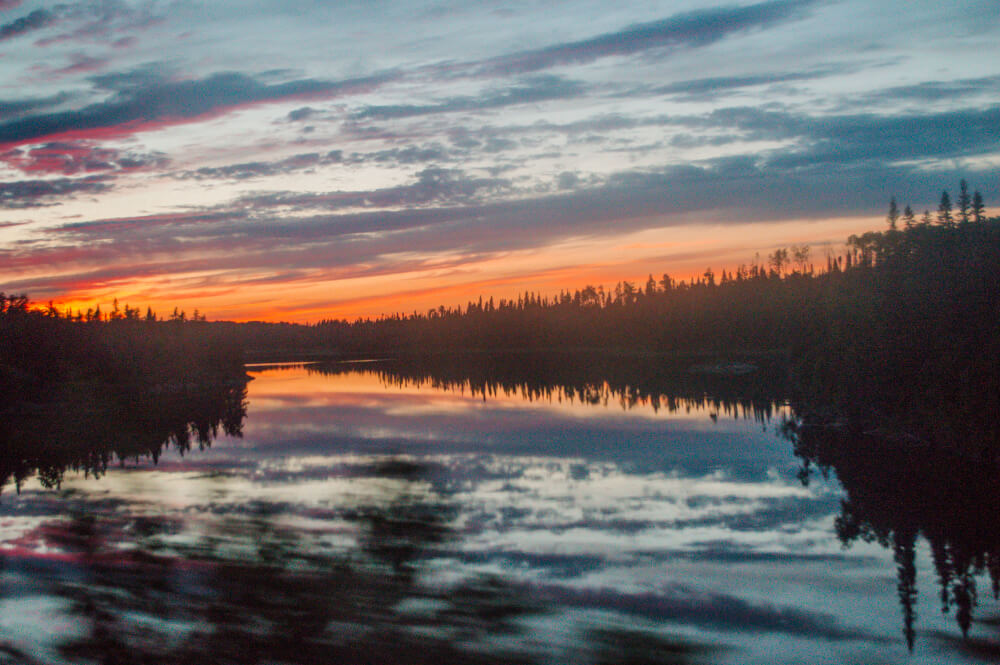
Prestige Class
Alright, now onto the fanciest one – the almighty Prestige class, officially unveiled in 2014. Some highlights of this ultra fancy class include…
- A larger cabin (said to be 50% larger than the regular cabin for two)
- Larger windows (said to be 60% larger than the regular cabin for two)
- A modular L-shaped couch
- An actual double bed (Murphy bed, but still!) rather than upper/lower berth beds
- A private washroom with a shower
- A flat-screen monitor with video selection
- A minibar stocked with your choice of beverages
- All inclusive food, snacks, and beverages (including alcohol)
- A concierge w/ turndown service and enhanced amenities
- Access to lounges in Vancouver and Toronto both upon departure and arrival
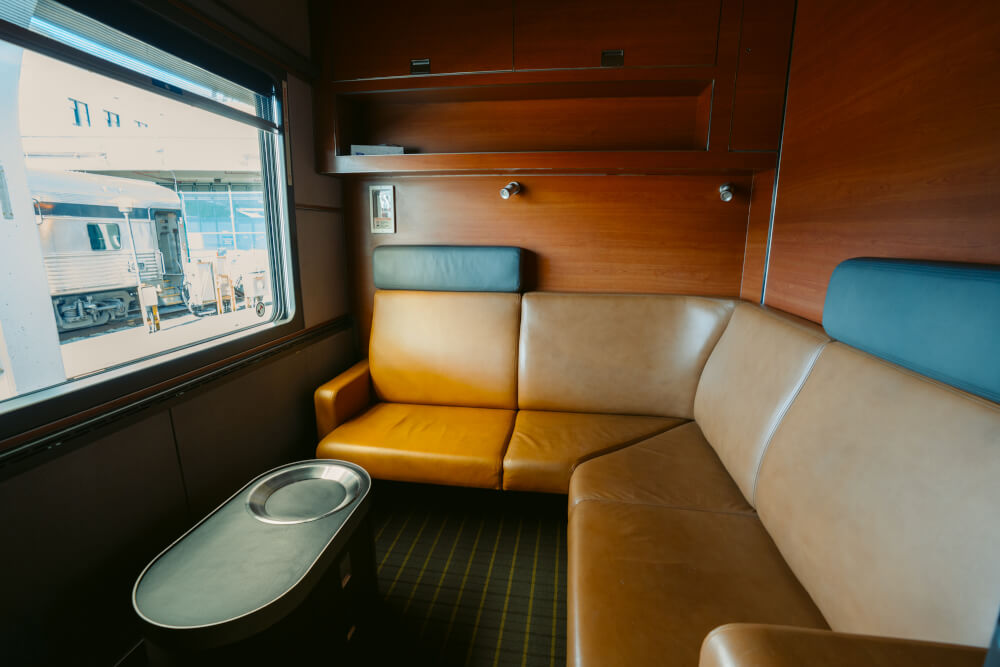
I mean, look at the bathroom!
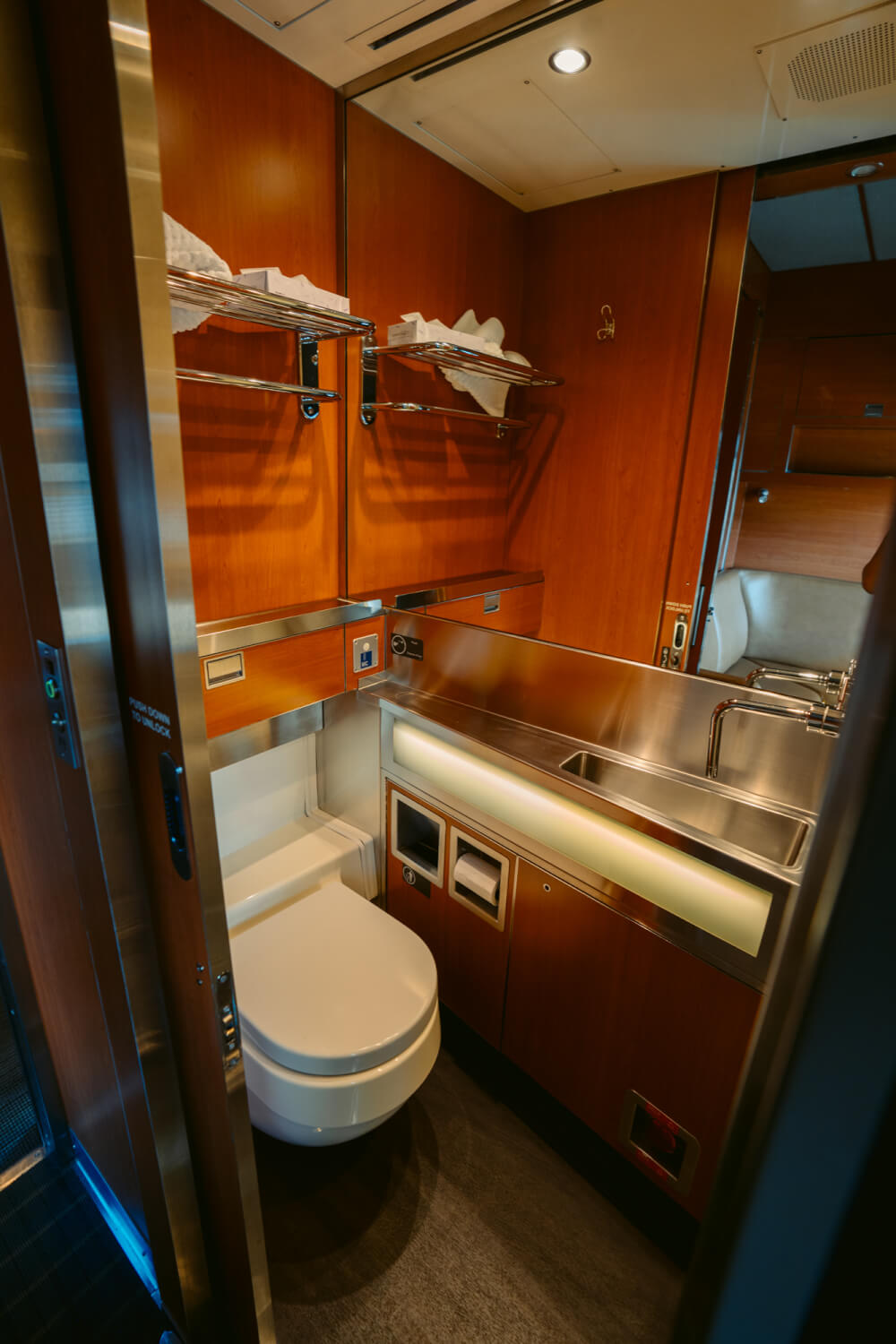
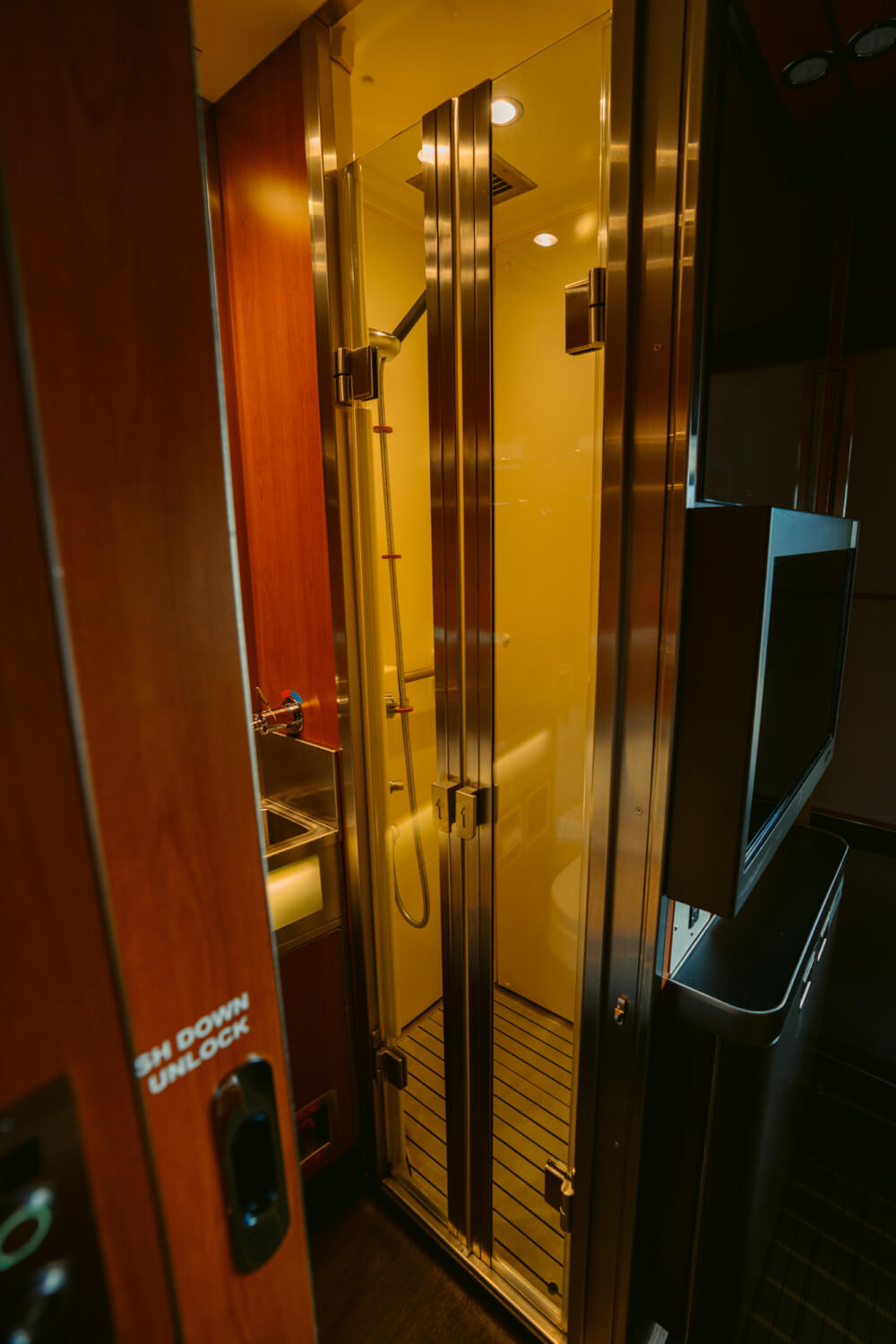
All in all, this is the most luxurious way by far to travel on board the Canadian, though it will certainly cost you (more on pricing below).
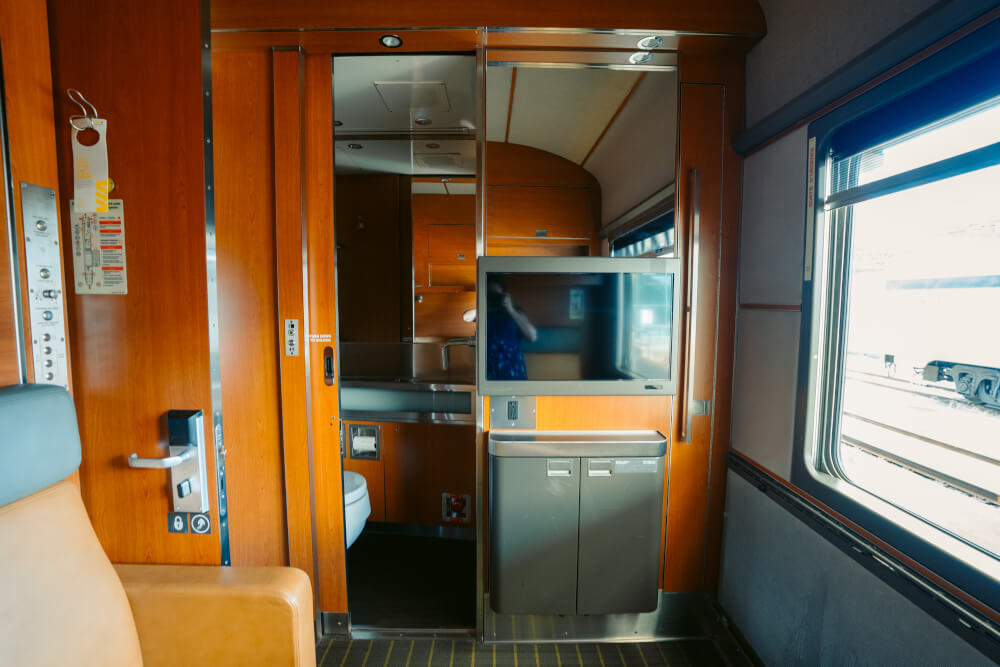
Finally: Accessible Cabins
As I mentioned in the introduction, one of my experiences on board the Canadian was during a media visit to take photos of the train for this article.
During this tour, I was very impressed to learn that they actually have a special accessible cabin on every train that is designed with wheelchair access in mind, and especially created for those whose mobility restrictions prevent them from exploring other parts of the train.
These cabins are more spacious, have a large accessible washroom, larger hallways, include room service, and consist of a bottom bunk and a fold-down top bunk for a helper (whose fare is waived).
So, definitely something to keep in mind if you’re looking for an accessible way to enjoy the journey!
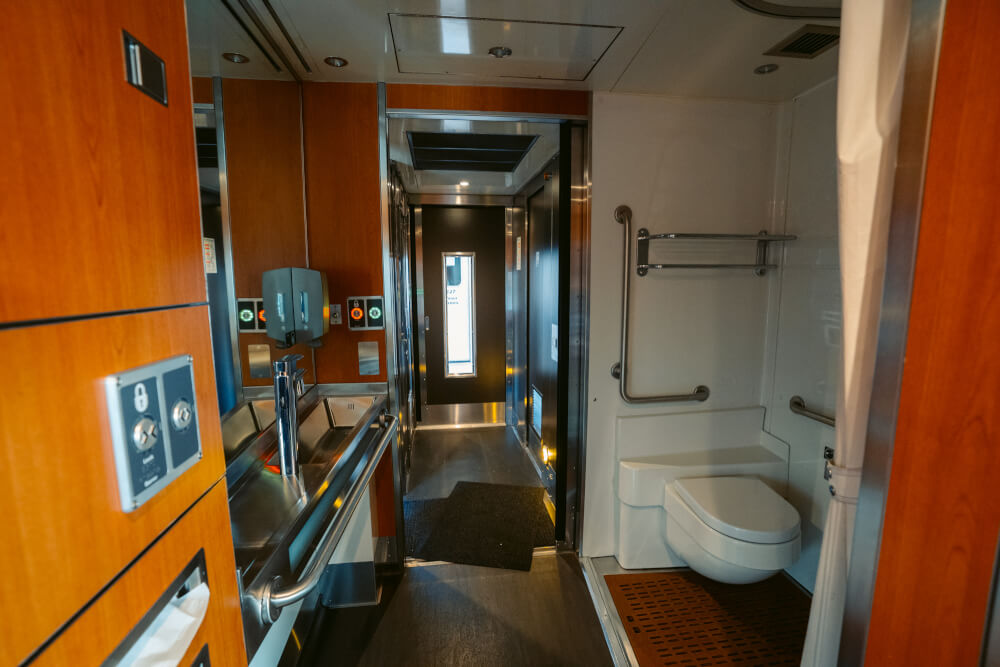
Different Cars on Board the Canadian
Now, having reviewed the different classes on board, it makes sense to show you the different types of cars that make up the Canadian. I’ll let the photos do most of the talking though…
Economy Car
This car is filled with economy class seating, with a public washroom and larger luggage racks on both ends of the car, as well as a water dispenser.
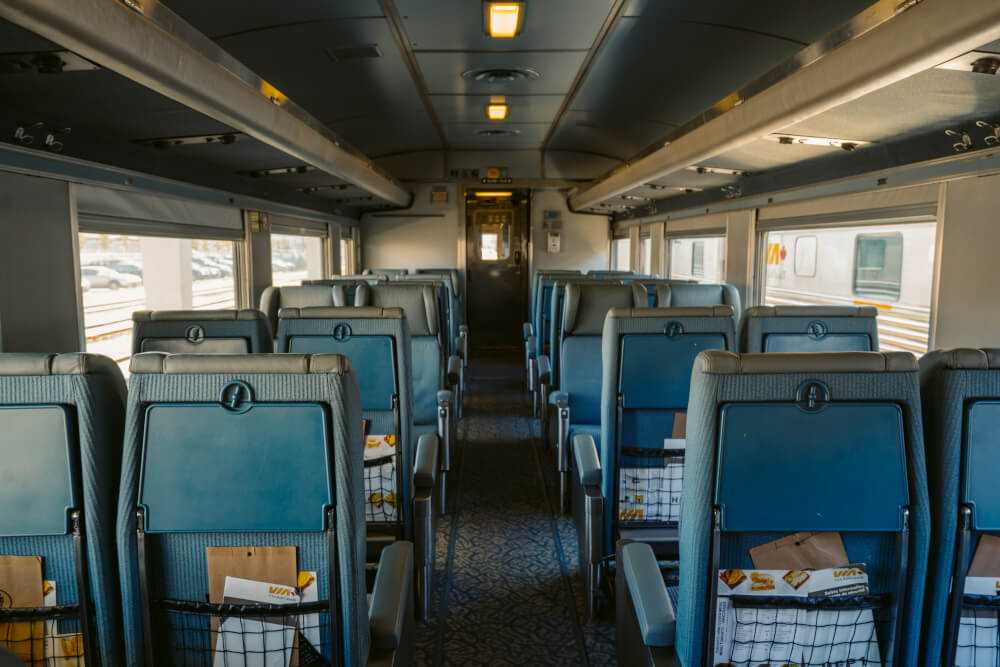
The bathrooms aren’t too glamorous here but they do the job:
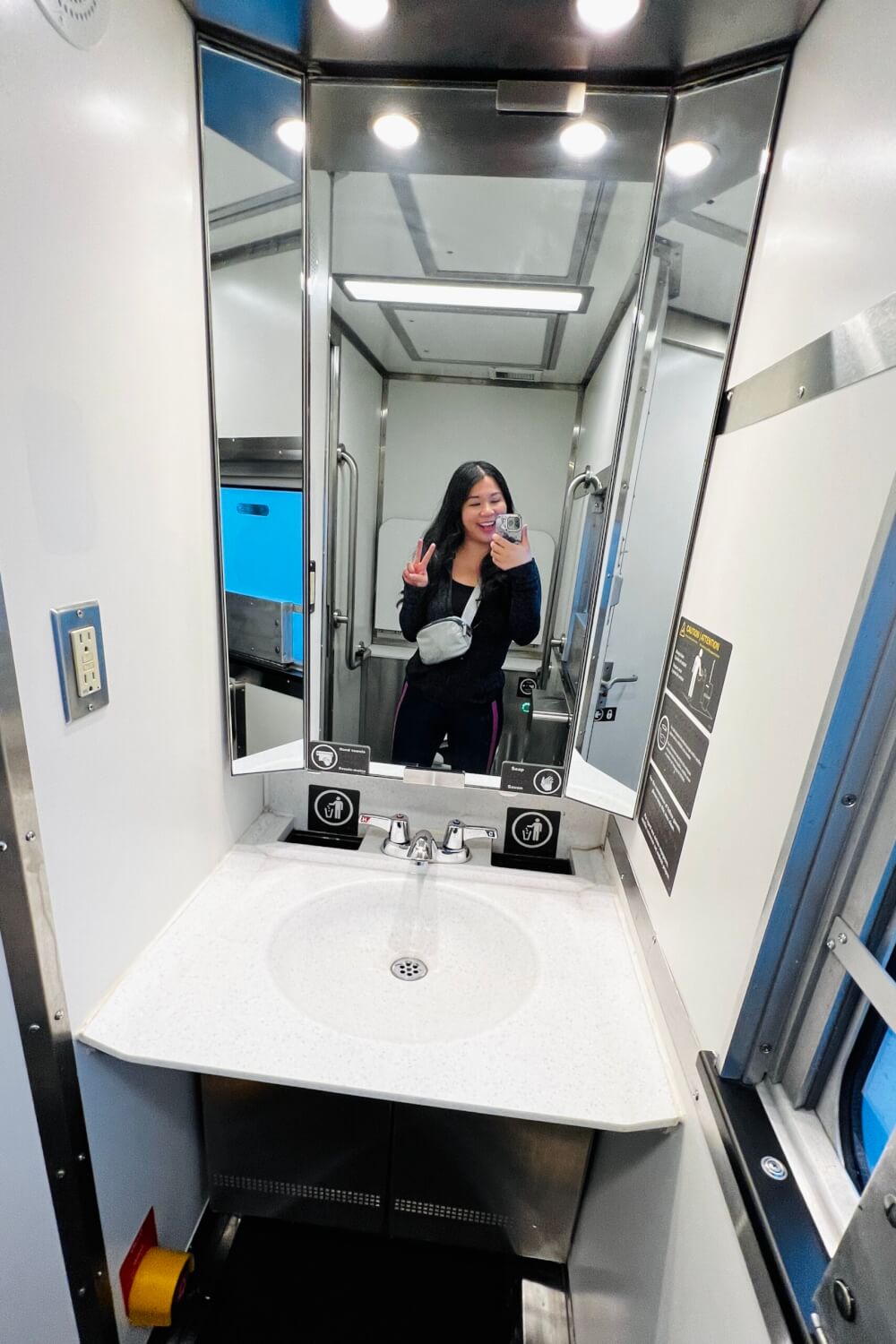
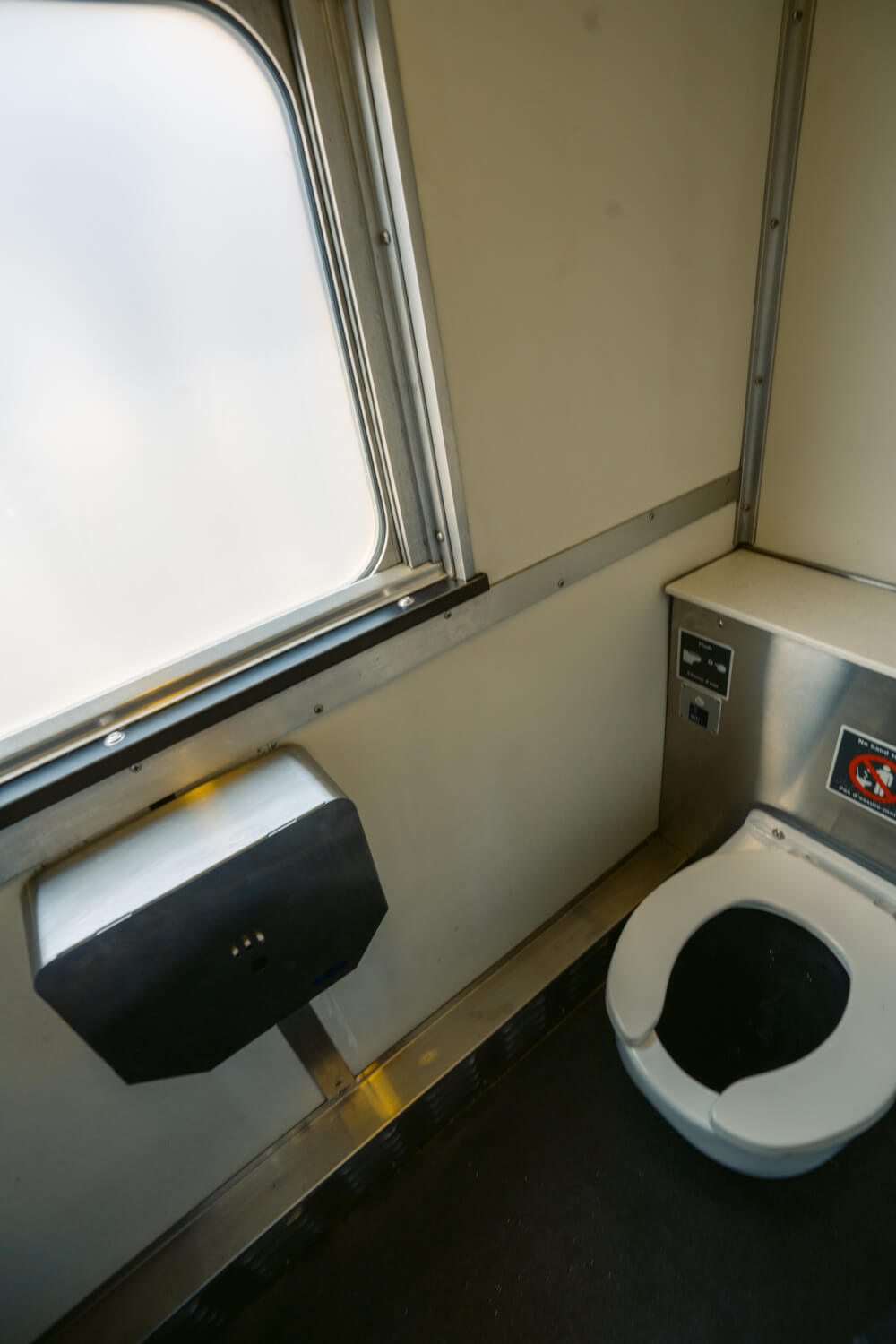
Skyline Car
This awesome car combines a café-style dining area with a lounge, plus a scenic dome seating area up top.
I believe there are two Skyline cars on every Canadian train – one dedicated to Economy class passengers and one for Sleeper Plus and Prestige Class customers.
The downstairs cafe area will usually look like this:
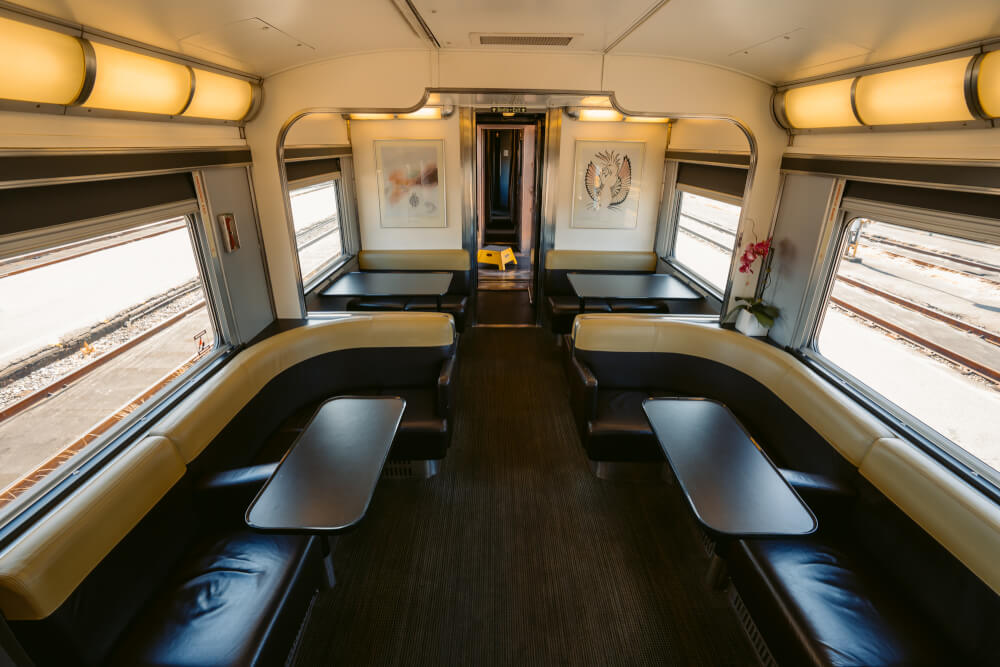
Then some stairs take you up to the amazing dome car! This is where I spent most of my time, and weirdly, it was never too busy. I actually had it all to myself at certain points.
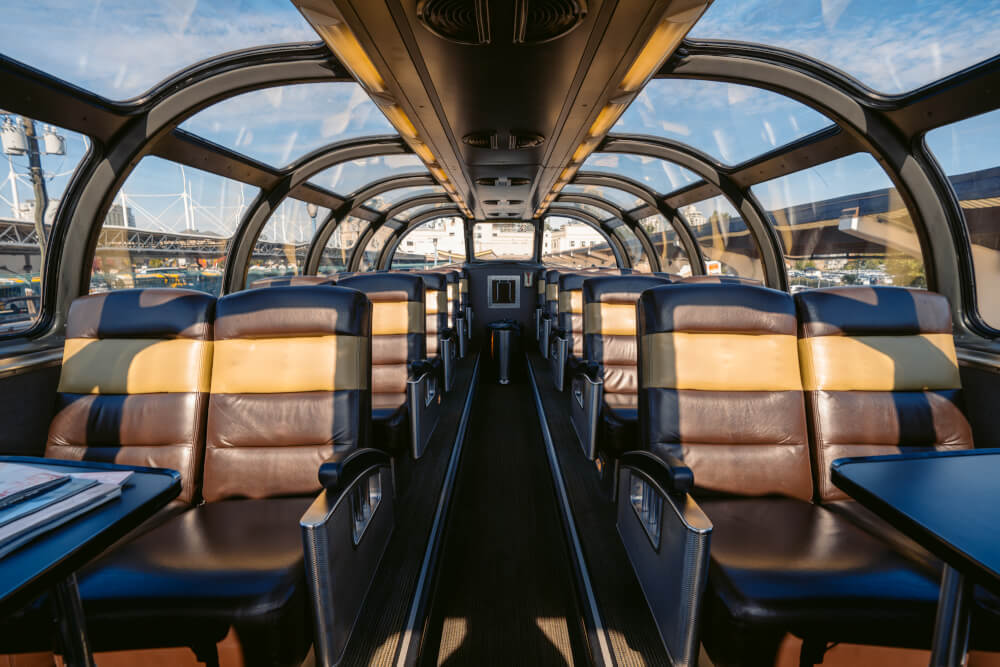
Dining Car
Available only to Sleeper Plus and Prestige Class customers, this is the car where all the meals are served. I think during service hours they of course dress it up with tablecloths and silverware, but you get the idea:
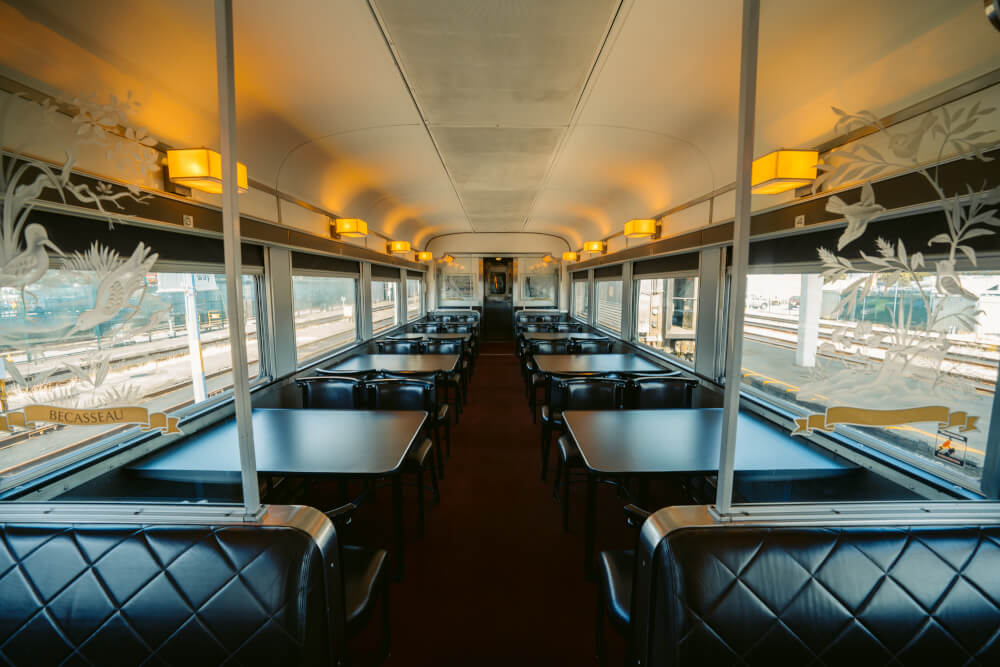
Sleeper Car
On the Canadian, there are usually both Manor Sleeper Cars and Château Sleeper Cars, which have different layouts, but are both cars used to house Sleeper Plus class passengers, like so:
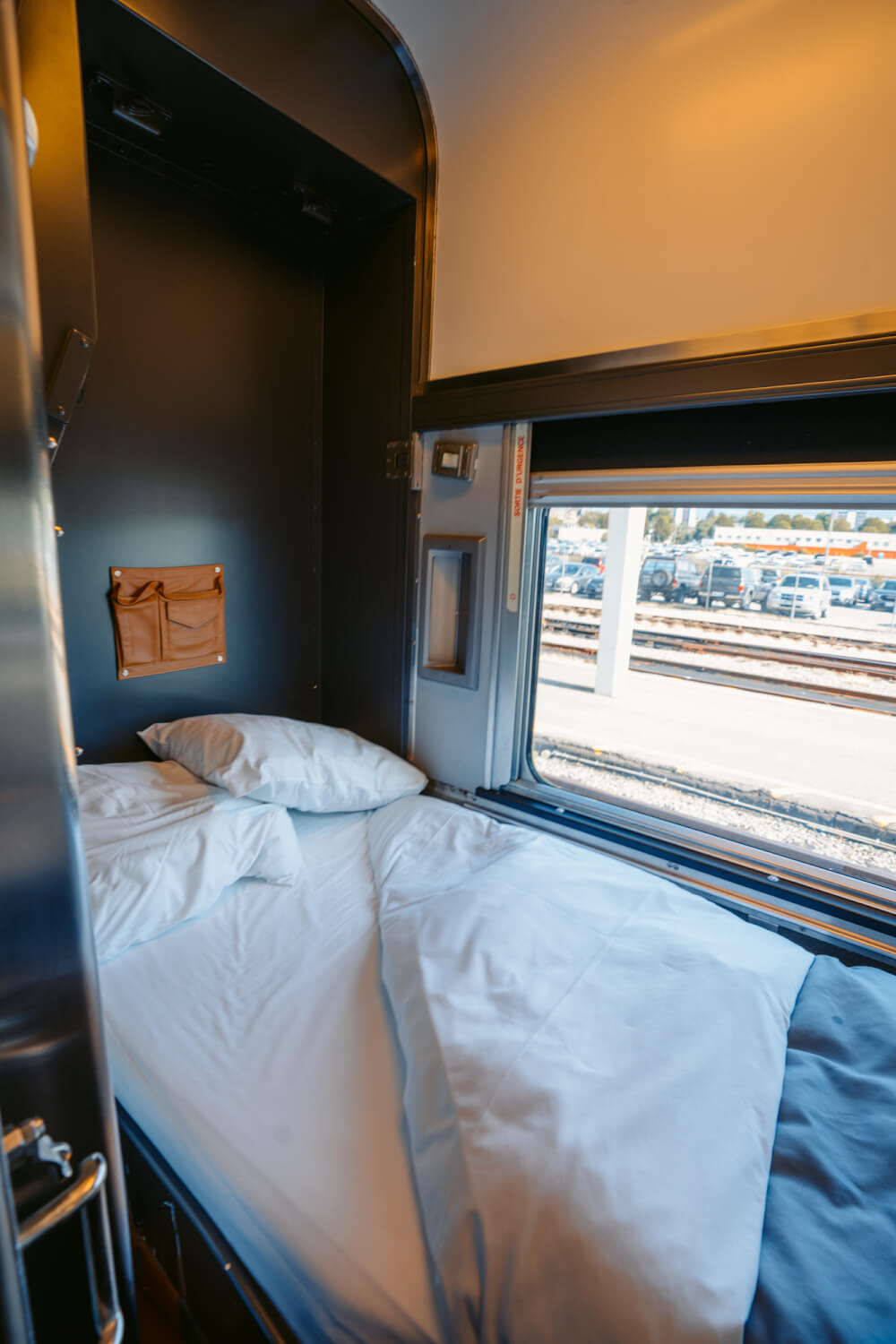
Prestige Car
This car is home to six swanky prestige class sleeper cabins.
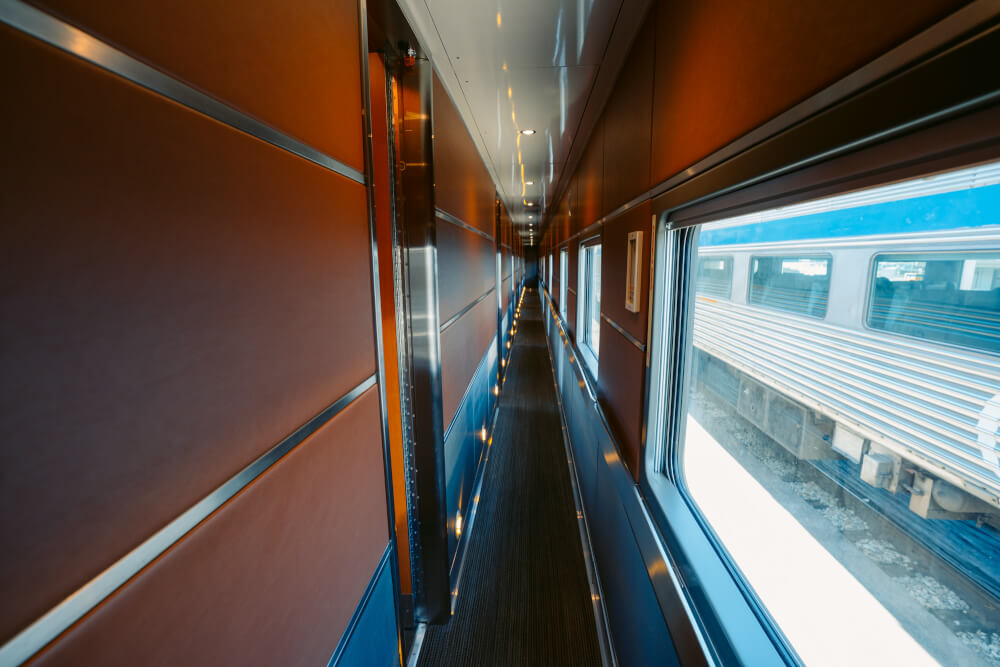
Prestige Park Car
This car is home to two different lounges, the Mural Lounge:
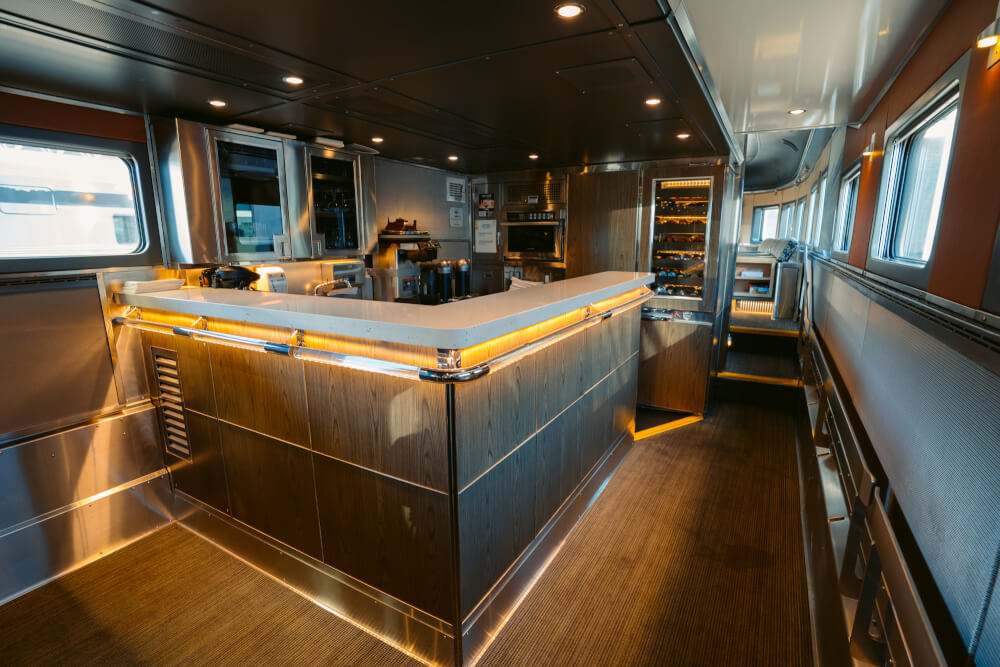
And the Bullet Lounge:
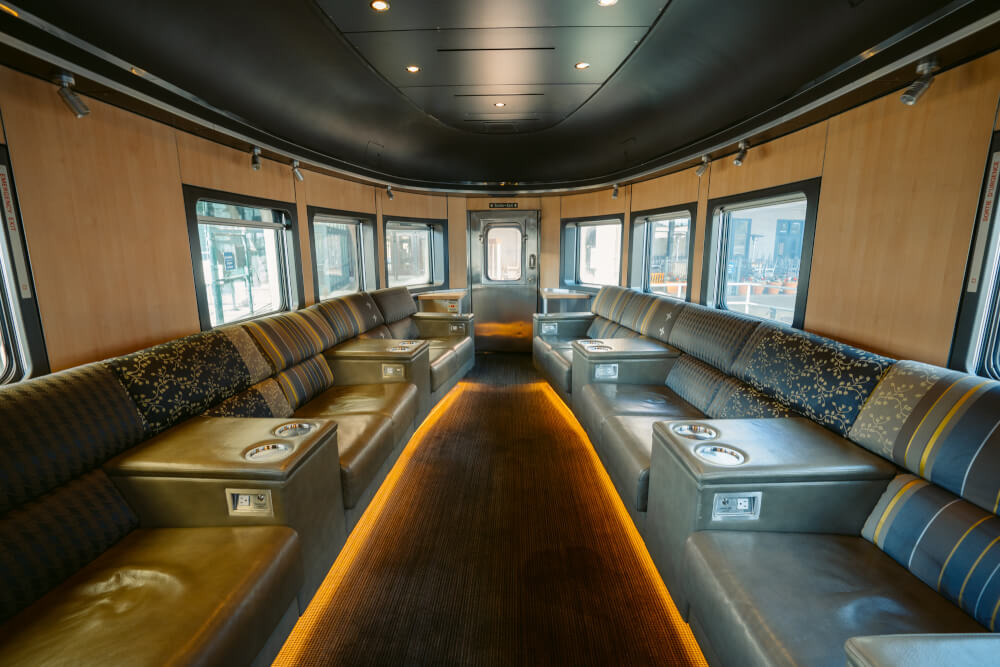
Plus a scenic top floor dome car as well, with some seats reserved for Prestige Class passengers.
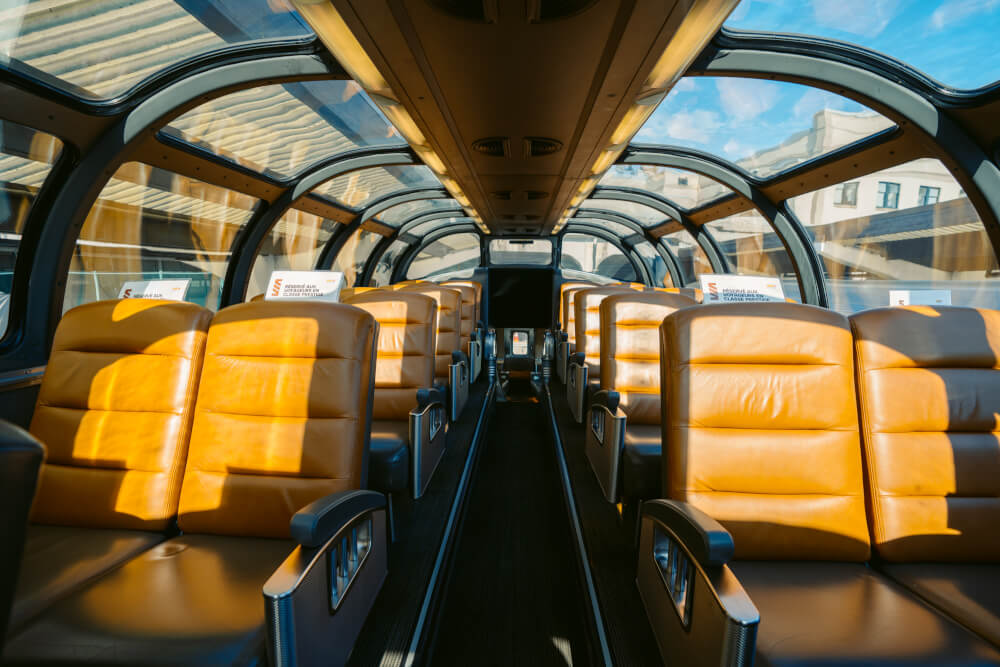
Panorama Car (Not Currently in Operation)
Lastly, just because I have this cool photo, I want to show you what the Panorama car looks like.
Unfortunately, these cars were not used in the 2023 season and before that were only added on between Vancouver and Edmonton in peak season, so I’m not sure if they’ll make a comeback.
Still, I imagine the views would have been wonderful!
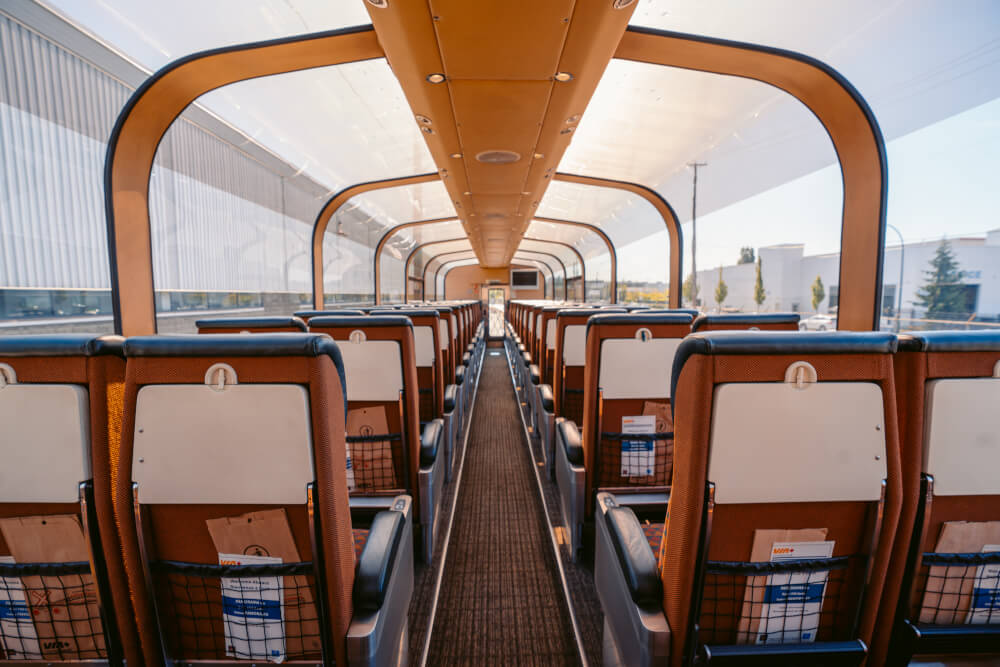
‘The Canadian’ Cost & Prices
Alright, now that I’ve dazzled you with all the pretty photos, it’s time to address the sad elephant in the room: cost.
Hopping on board the Canadian is a bucket list item for a lot of people, and so unsurprisingly, it comes with a hefty price tag.
Ticket prices with VIA Rail are dynamic, meaning they change constantly in response to factors like availability, demand, etc.
I’ll share some tips below on how to get the best possible deal, but let’s quickly talk ‘base fares’ (or the cheapest possible price they offer, as shown in the chart below).
For a quick fare comparison, you can check the official website here (which is where I grabbed this screenshot):
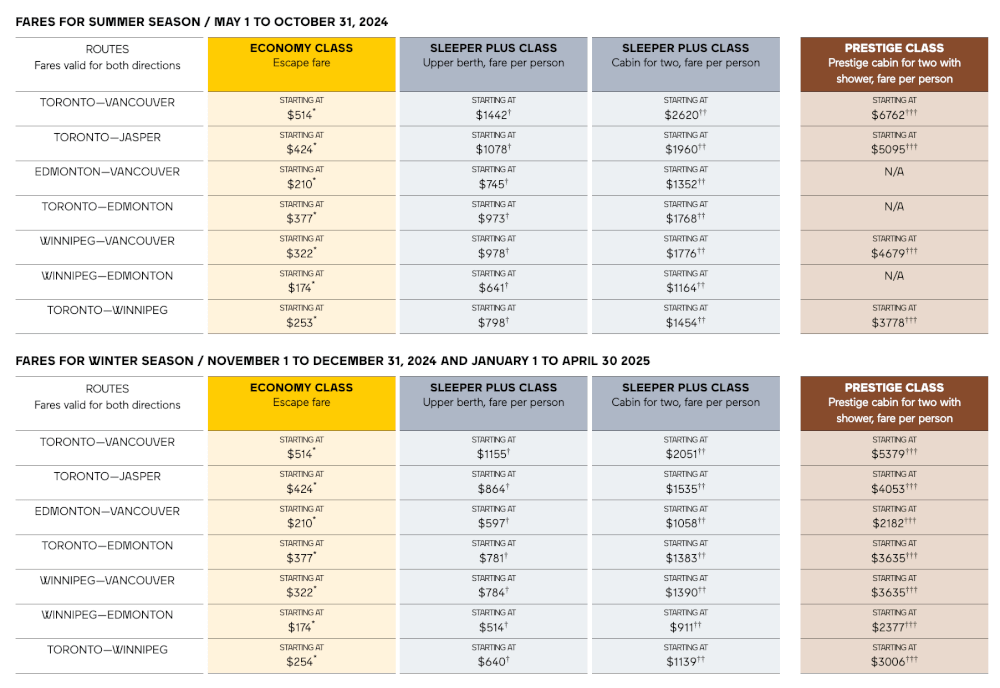
As you can see from the chart, starting fares are more or less the same in Economy Class for both Summer and Winter, but a few hundred dollars cheaper for Sleeper Plus and Prestige Class in the winter time.
That said, you’ll still easily spend 10k on Prestige class between two people.
So as you can see, the prices are pretty steep. For what it’s worth however, in Sleeper Plus and Prestige class, your meals are all included so that’s at least… slightly better value?
With that in mind, if you book in Economy class, do note that meals are not included, so that’s an additional cost to consider.
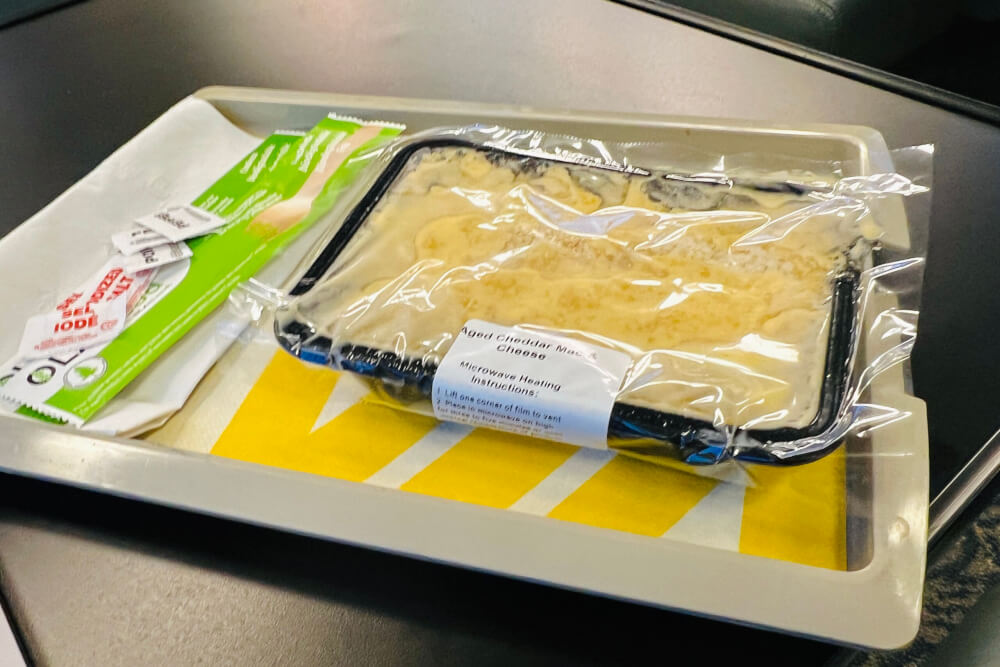
How to Find VIA Rail Train deals
No matter what, your train trip on the Canadian won’t be cheap, but if you’re fishing for a VIA Rail discount of some kind to help ease the financial woe, there are a few different ways that you can potentially score cheaper fares. Here’s a quick summary:
- Discounts for certain groups: VIA Rail offers discounts for CAA Members, passengers age 65+, Children, Youth and student travellers, Indigenous persons, Canadian military, Groups & Corporate accounts
- Book on Tuesdays: VIA Rail has a weekly deal day known as ‘Discount Tuesday’ where you can save some money with the code TUESDAY.
- Find deals on the Lowest Fares page: This will show you the best deals departing from your city and can help you score some VERY good discounts in off-season for sleeper cabins, etc. I was looking into this earlier in the year and there were sleeper cabins available for 50% off!
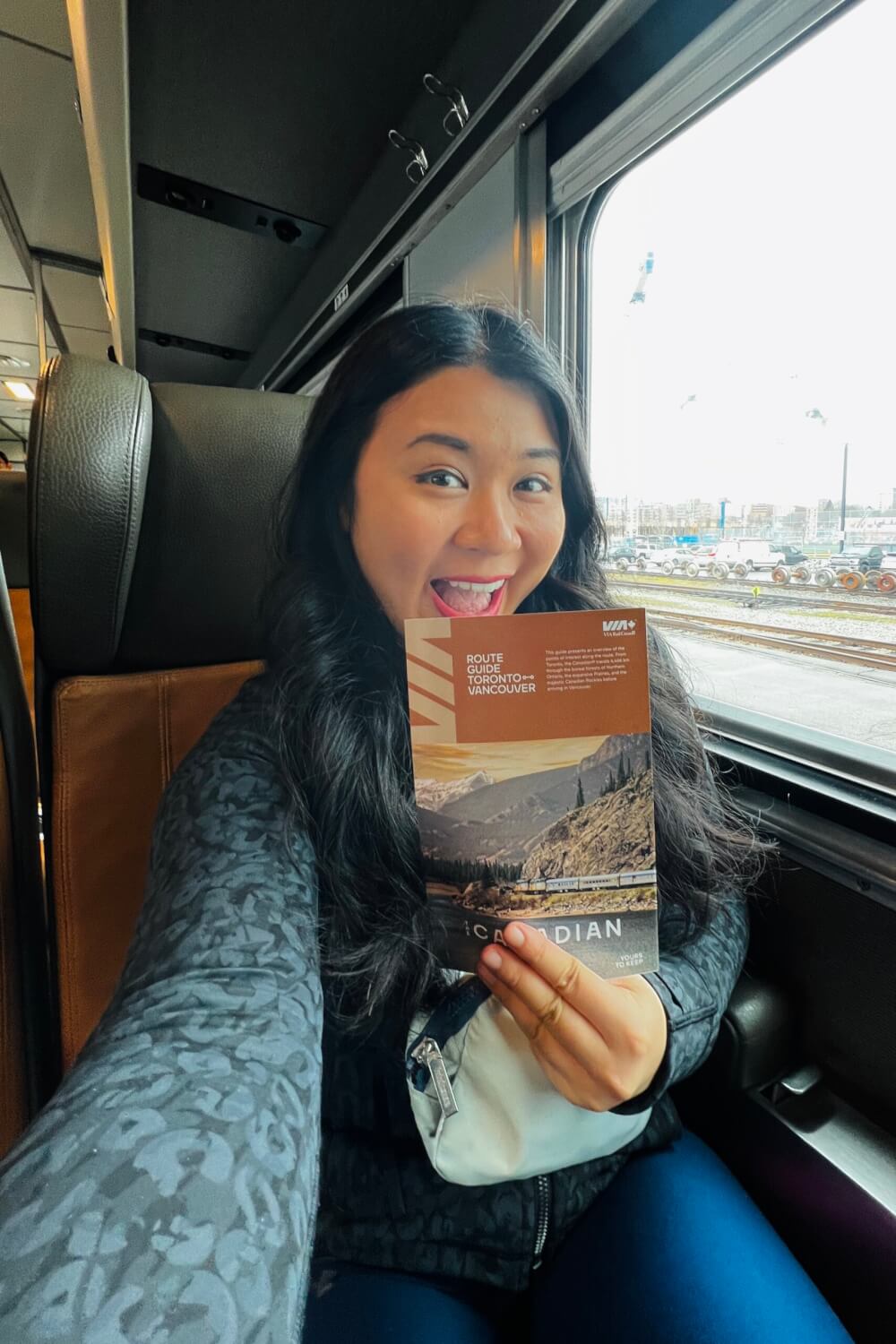
Important Must-Knows Before You Book Tickets for The Canadian
Alright, so before you splurge and book those tickets for the Canadian, here are some things that you need to keep in mind. I’ve mentioned a lot of this above, but just in case you skim read or need a refresher…
Hopping on the Canadian is the only way to take the train across Canada
As it stands, VIA Rail kind of has a monopoly on passenger rail in Canada, so the silver lining is you won’t be paralyzed by choice! If it’s your dream to take the train across Canada, VIA Rail is the only company that you can book with. So, don’t bother trying to find cheaper alternatives – they simply do not exist.
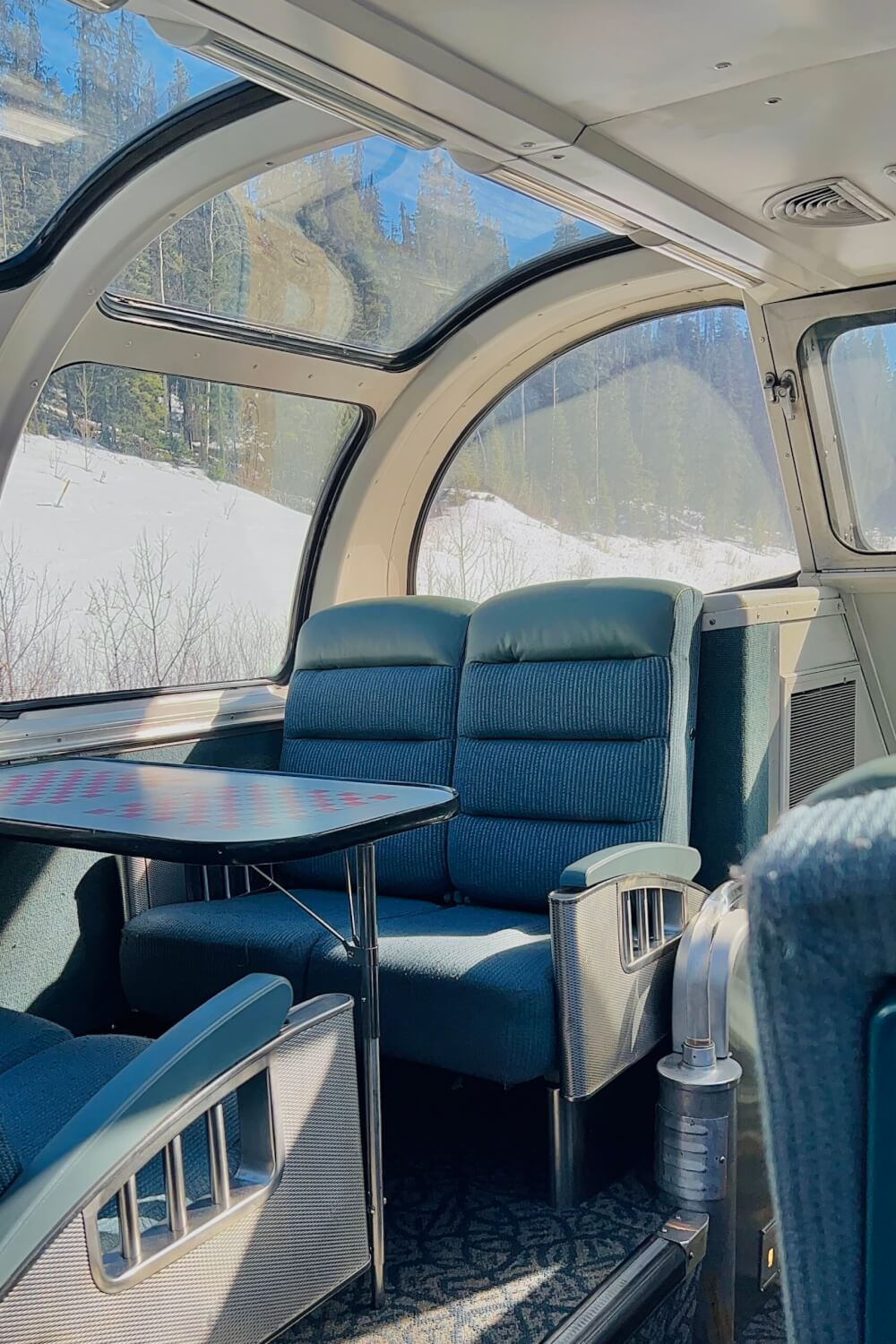
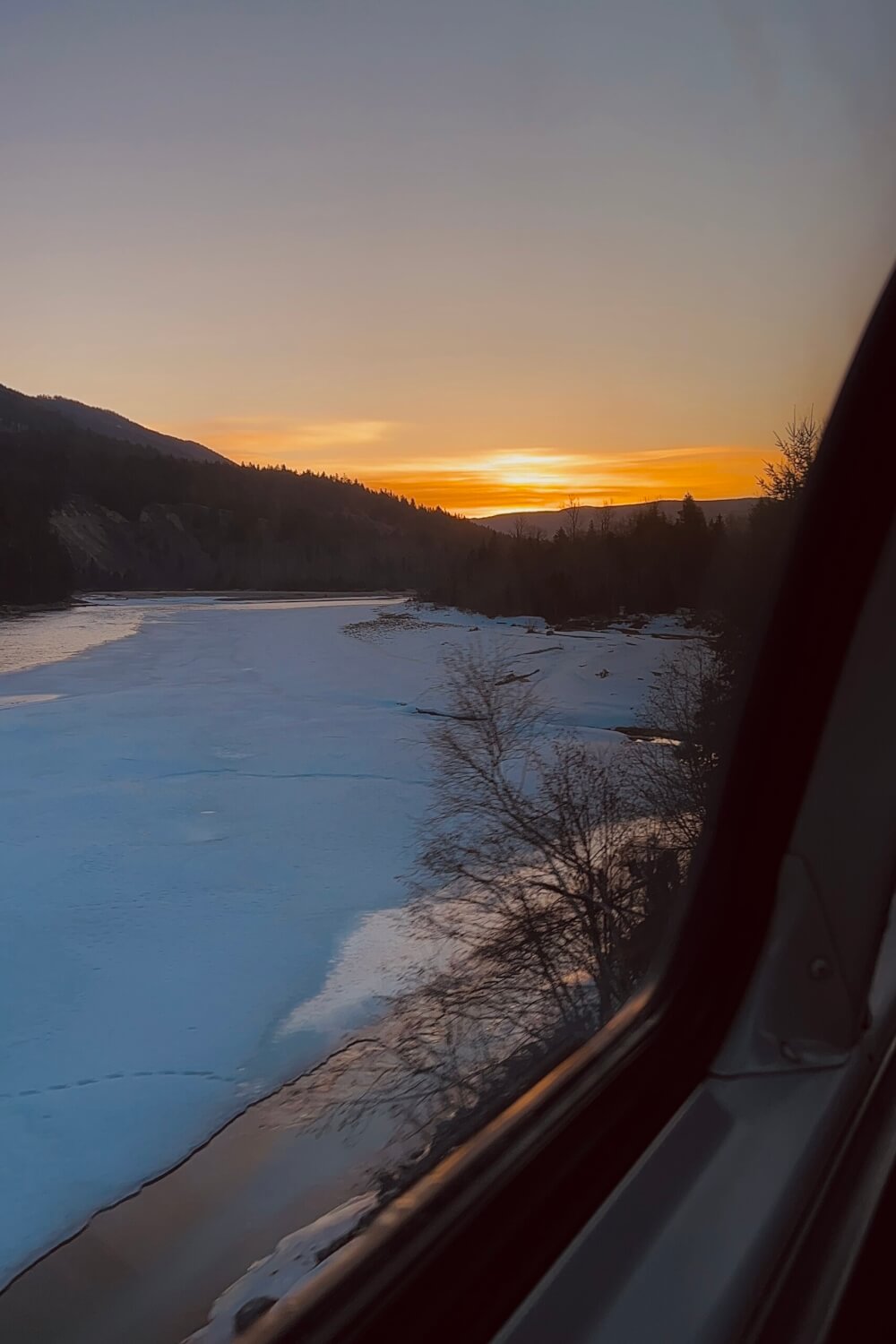
That said, the Canadian does not take you coast to coast across Canada
Canada is a massive country, and billing ‘The Canadian’ as a train across Canada is true, but a bit of a misnomer because it doesn’t actually bring you ALL the way across Canada. The distance between Vancouver and Toronto is far for sure, but it neglects some of the most charming parts of the country: Québec and the Maritime provinces. In order to get all the way to the Atlantic Coast of Canada, you’ll need to continue your journey with a trip on “The Ocean” train.
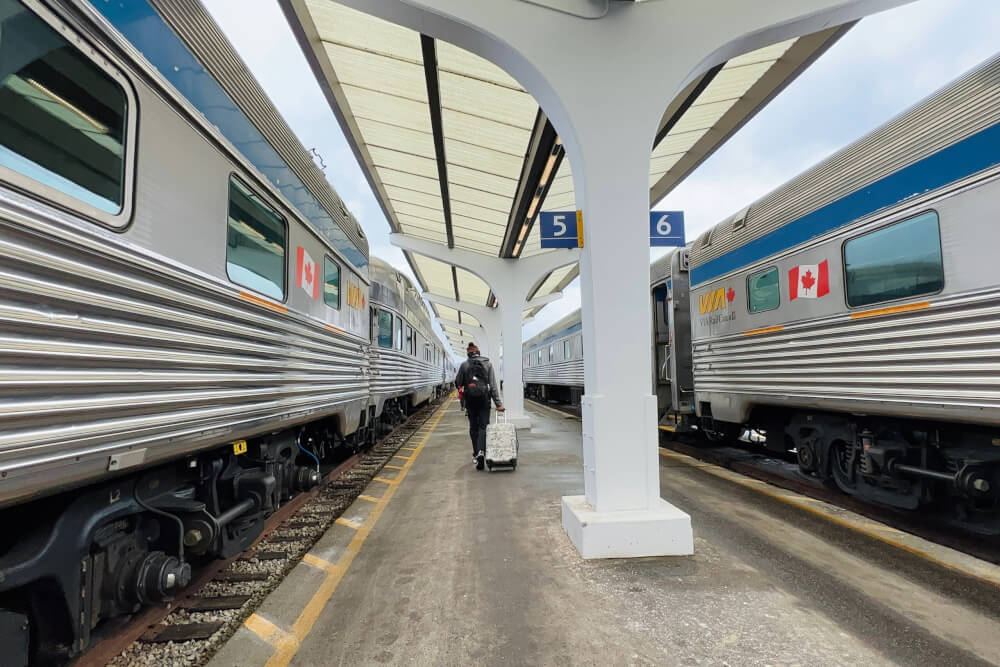
The Canadian is rarely punctual, so expect it to run late
Although delays have gotten better in recent years as they’ve adjusted their schedule to account for longer journey times, it is still common for the Canadian to arrive hours if not days after the scheduled arrival time (with delays accruing and getting worse later in the journey), so make sure you do not book any onward travel within 24 hours.
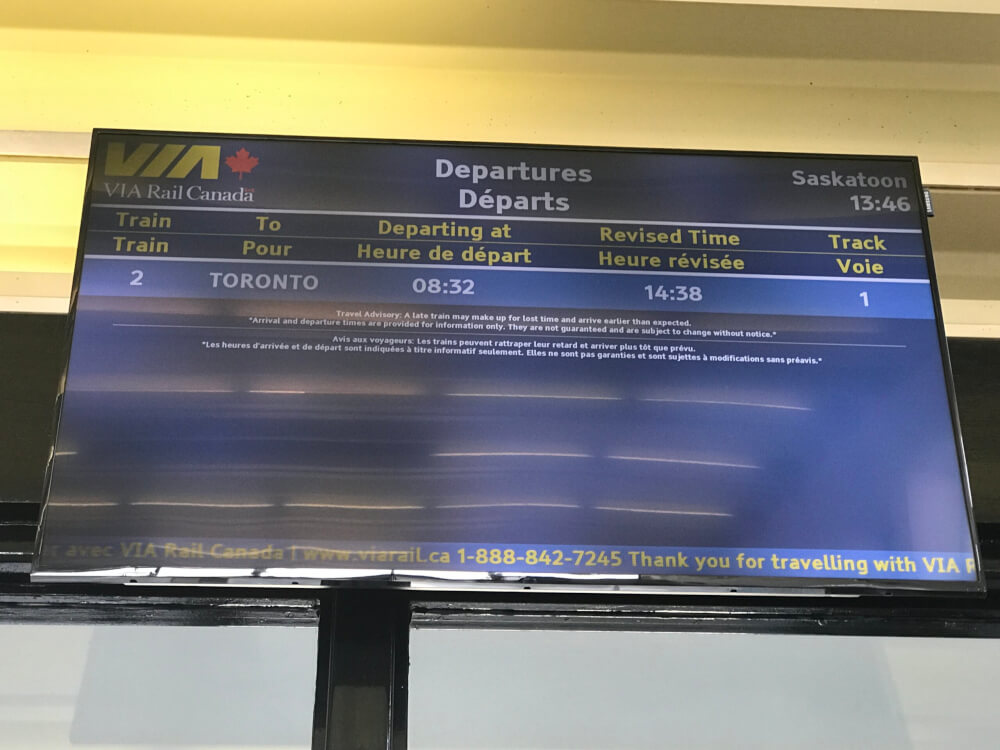
There is no WiFi on board the Canadian
I know. How will you survive???
I recognize that this is a silly first world problem, but I still want to mention it in case you’re expecting to stay connected the entire time. Where this might be a little tricky is if you need Internet to contact friends/family or perhaps modify reservations in response to a train delay.
It’s also worth noting that there are large sections of the trip where I personally had no data or service at all, which felt equal parts freeing and spooky.
This is an easy thing to prepare for though – just ensure that you have plenty of entertainment for yourself downloaded for offline use. Dare I say, even a book perhaps?!
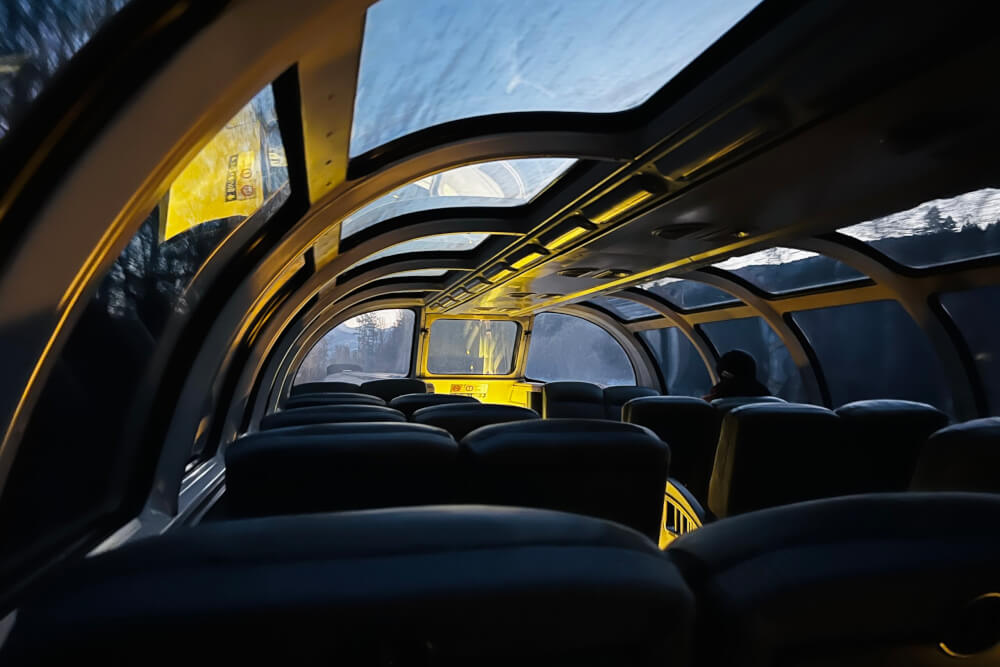
Sleeper Plus and Prestige Class both have day time and night time configurations
This makes a lot of sense but I figured I would mention it for those who aren’t familiar with the configuration of the sleeper/prestige cabins – basically none of the beds stay in “bed” formation all day – they all fold up and become regular seats/benches during the day so you can sit up and enjoy the views.
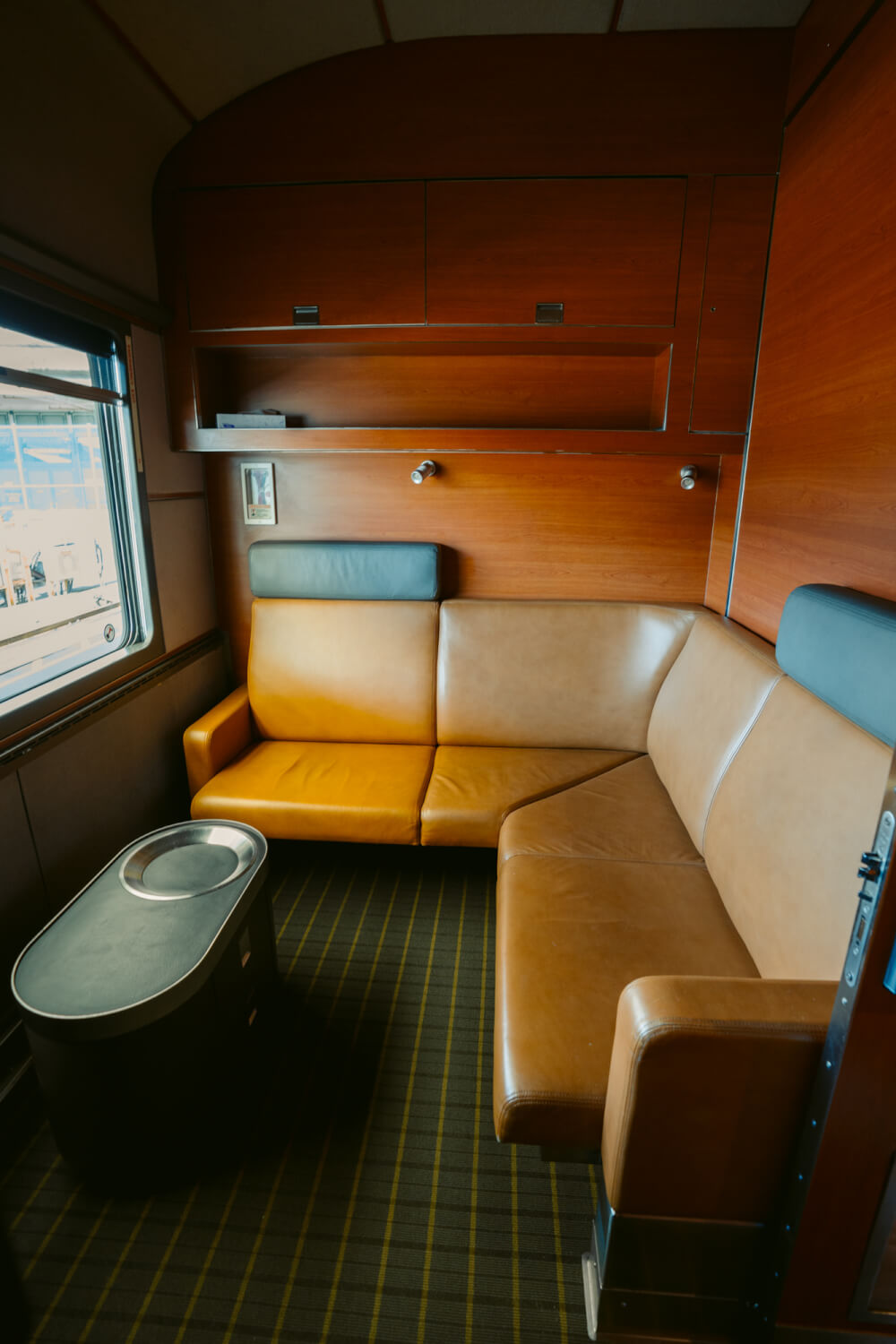
You can only fold down your own bed in the Cabin for One
Some of the cabins (like in Prestige Class and the Cabins for Two) cannot fold down without help from staff, so keep that in mind if you’re one who enjoys fun little daytime naps… not that you should sleep through the views too much anyway!
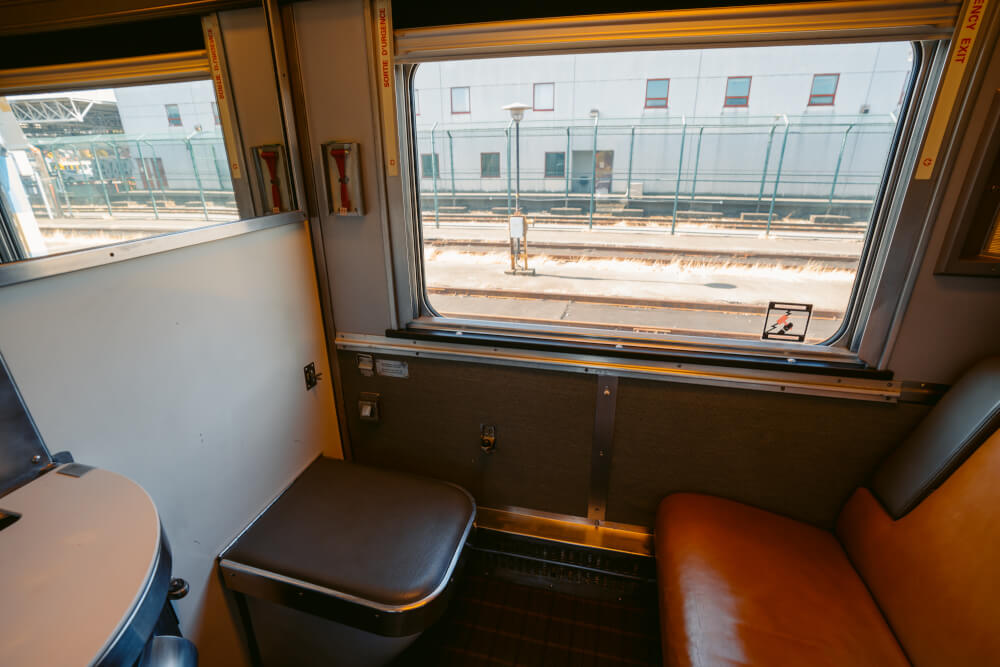
Consider adding a stopover for the optimal experience
Spending 5-6 days non-stop on a train would make anybody a bit crazy, I think, regardless of how nice the train is, so to present train burnout, I would highly recommend booking a stopover somewhere.
Canada is a vast, beautiful country, and to really make the most of your experience on board the Canadian, you should try to schedule a stopover in a city to break up your trip.
Jasper is of course a very popular choice as its national park is stunning (and I’ve written this list of car-free things to do in Jasper too, specifically for train folk!), but I actually also stopped in Winnipeg and Saskatoon as well, both of which were surprisingly fun and vibrant cities.
NOTE: While one free stopover used to be included, this appears to no longer be the case and so if you want to organize a stopover, make sure you book separate tickets for each leg.
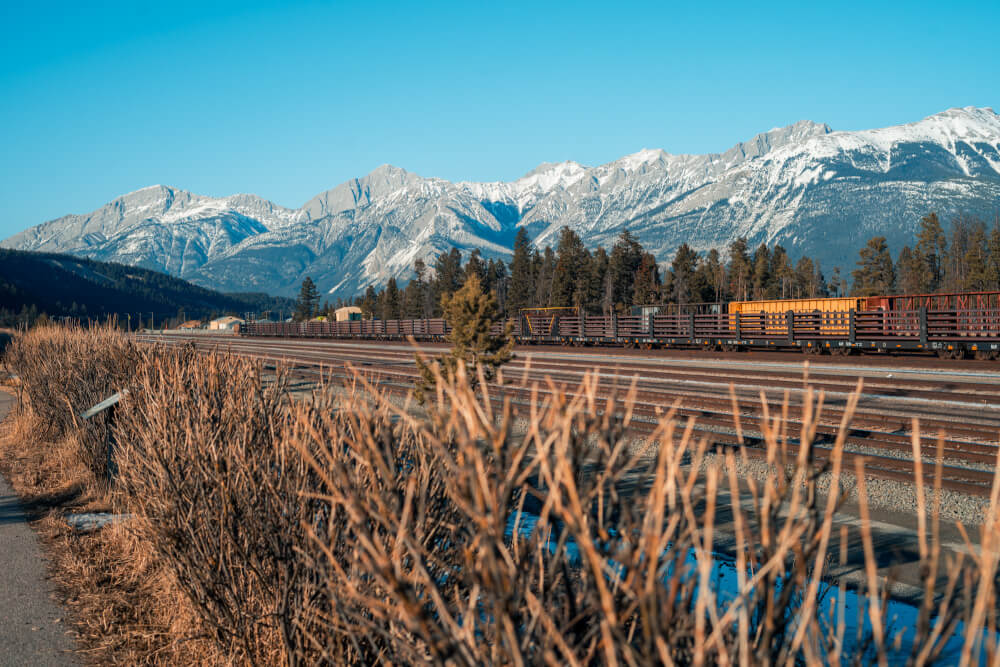
July and August can actually be quieter
As I learned during my tour with VIA Rail’s International Sales manager, apparently the busiest months for the Canadian tend to be May and September. At first I thought this was counter-intuitive, but hey, if that’s what the data says…
All to say, be sure to look into those peak months too and don’t count them out right off the bat. I can say my recent trip in March was VERY quiet:
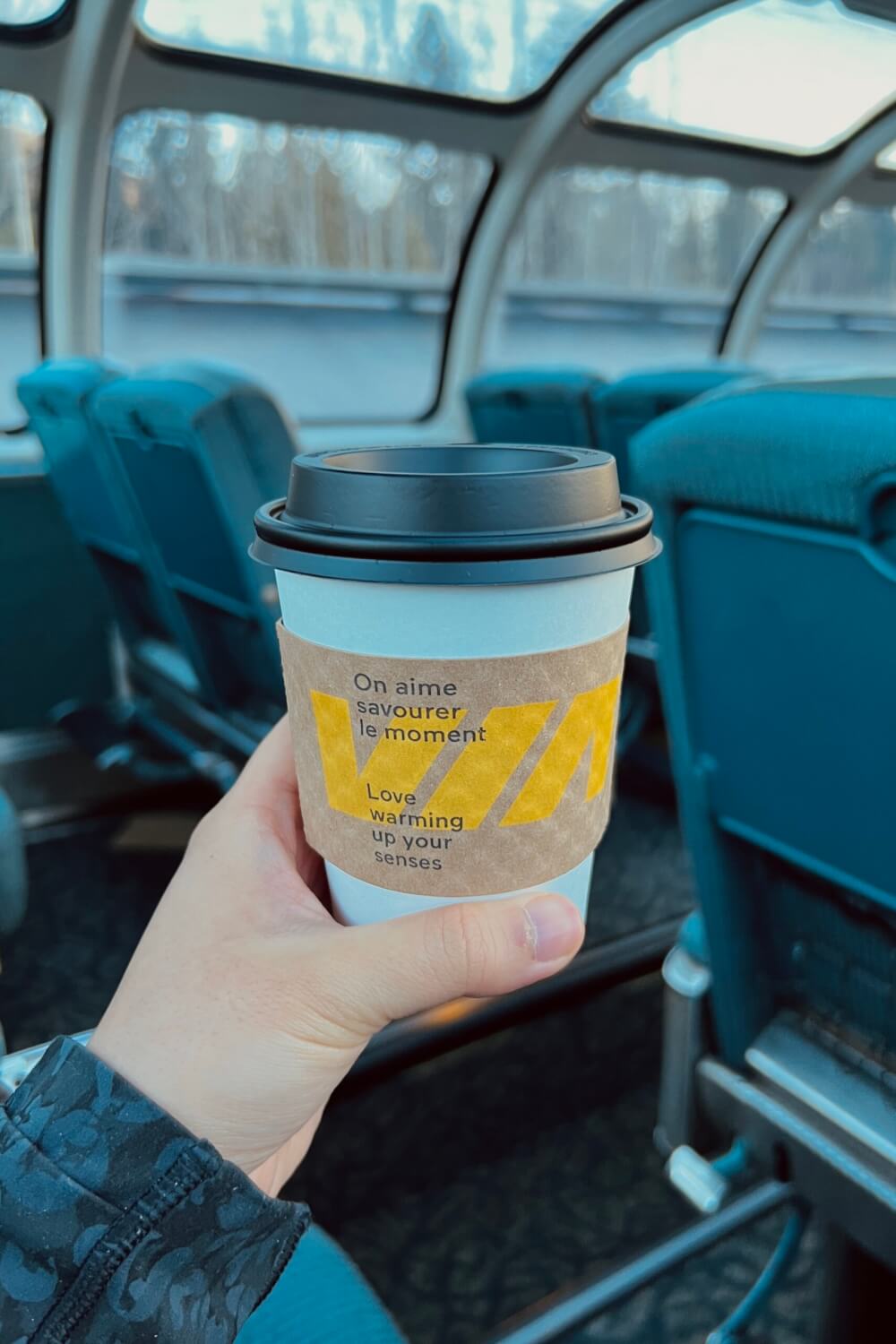
The Prestige Class is the only class where you can get a double bed
If you are planning to book the Canadian as a romantic bucket list trip or maybe a honeymoon, be warned that the only class where you could snuggle up to your partner and share a double bed is in Prestige Class.
Even the Cabins for 2 are designed to consist of two bunks, so consider that if you are planning to make this train trip across Canada a romantic one.
Train travel across Canada is not necessarily glamorous, but it is charming
I always had this very glamorous image of train travel in my head (I blame Agatha Christie)… and while the sleeper class and Prestige cars on board are nice, they’re far from the ultra-luxury you might expect given their significant price tags.
The cabins for instance aren’t particularly ornate or glitzy, and even in a pricey cabin for one, you’ll be sleeping where you pee… but hey, it’s still a fun experience, and worth going for if budget allows.
But hey, if you’re into luxurious train rides, be sure to check out my $7000 train ride in India.
Tips for Making the Most of Your Canadian Experience
Ready to hop on board? Here are some bonus tips to ensure you have a great time.
Go in expecting there to be delays
Again, it’s safe to assume you will encounter delays on board the Canadian, so plan accordingly by booking flexible hotels, and also not booking any onward travel within 24h of the expected arrival time.
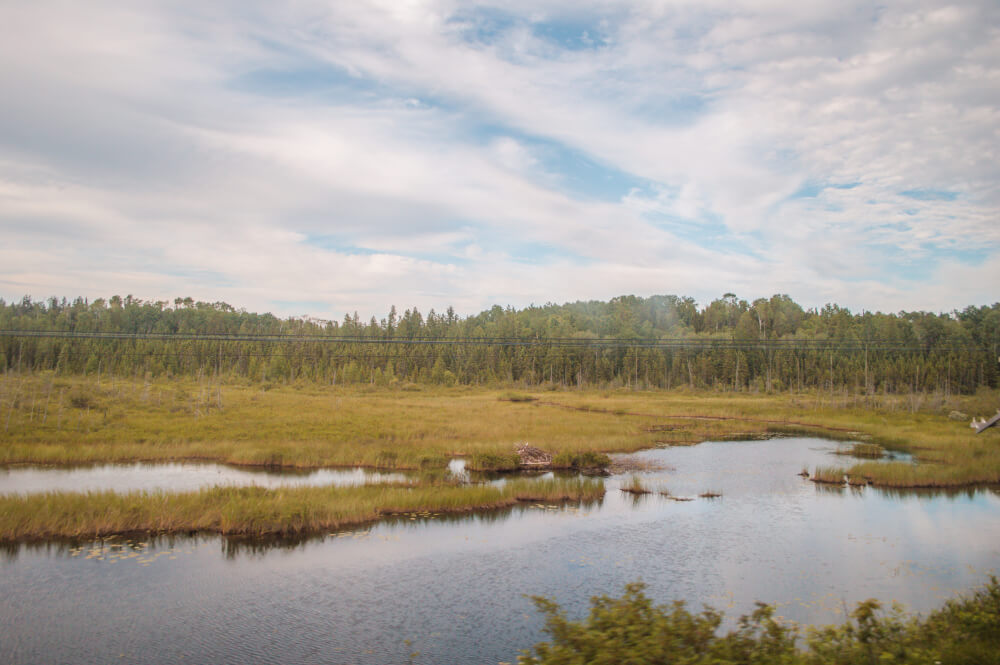
Make sure you pack the essentials
Things to pack for your Canadian train ride:
- An e-Reader like this one
- Noise cancelling headphones (these are mine)
- Books (if you’re more old school)
- Movies/TV shows downloaded for offline use
- Snacks and drinks
- A portable charger (this is mine)
- A comfy travel pillow or blanket (this is a great travel blanket that zips up to be a pillow!)
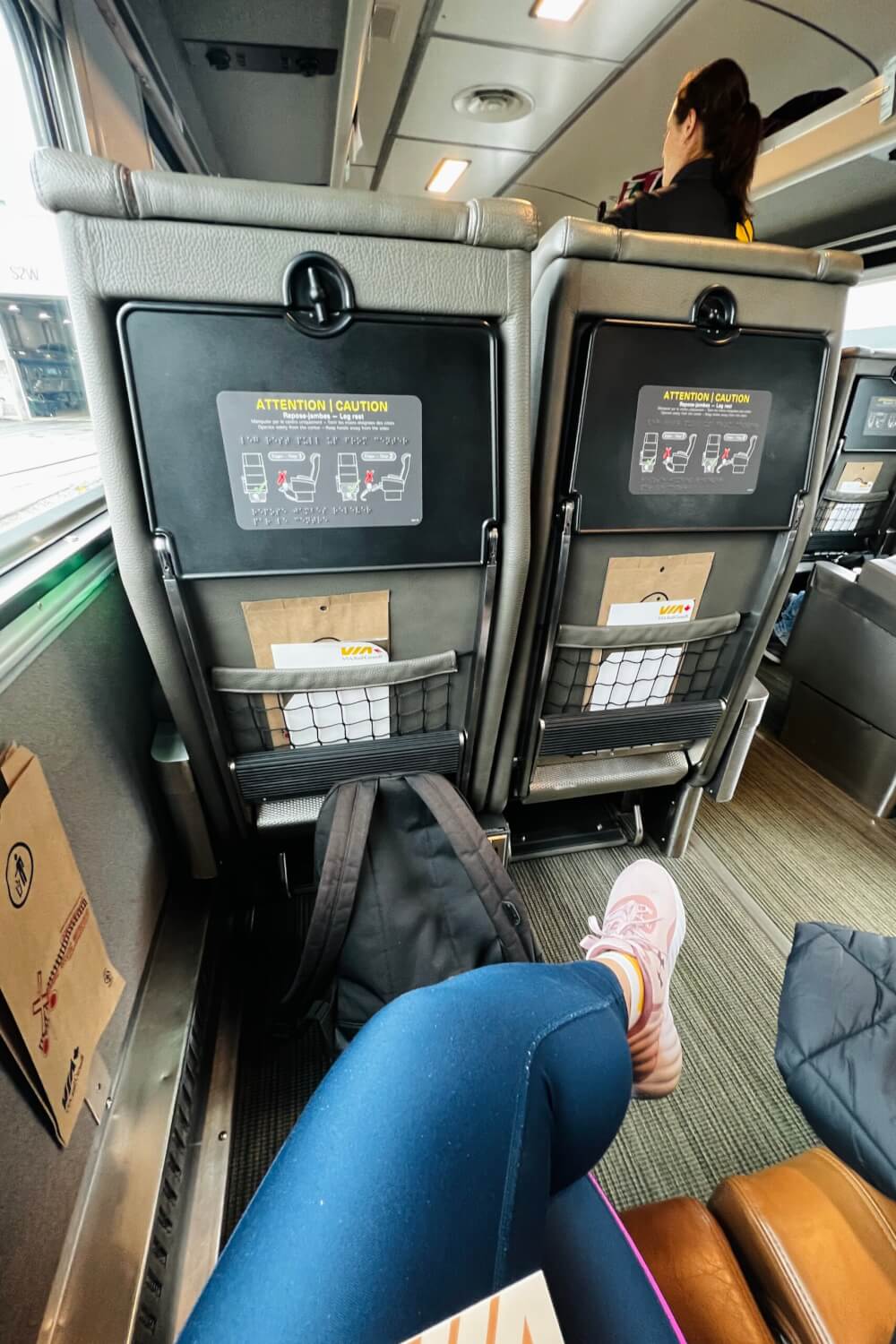
Be prepared for photo opps
While they’ll usually announce major sights and photo opportunities over the speaker, they can often go by really quickly, so it helps to be prepared and know in advance when pretty sights are coming up to make sure a) you’re not asleep and b) your camera’s ready!
This little guide can be helpful for keeping track of where you are:
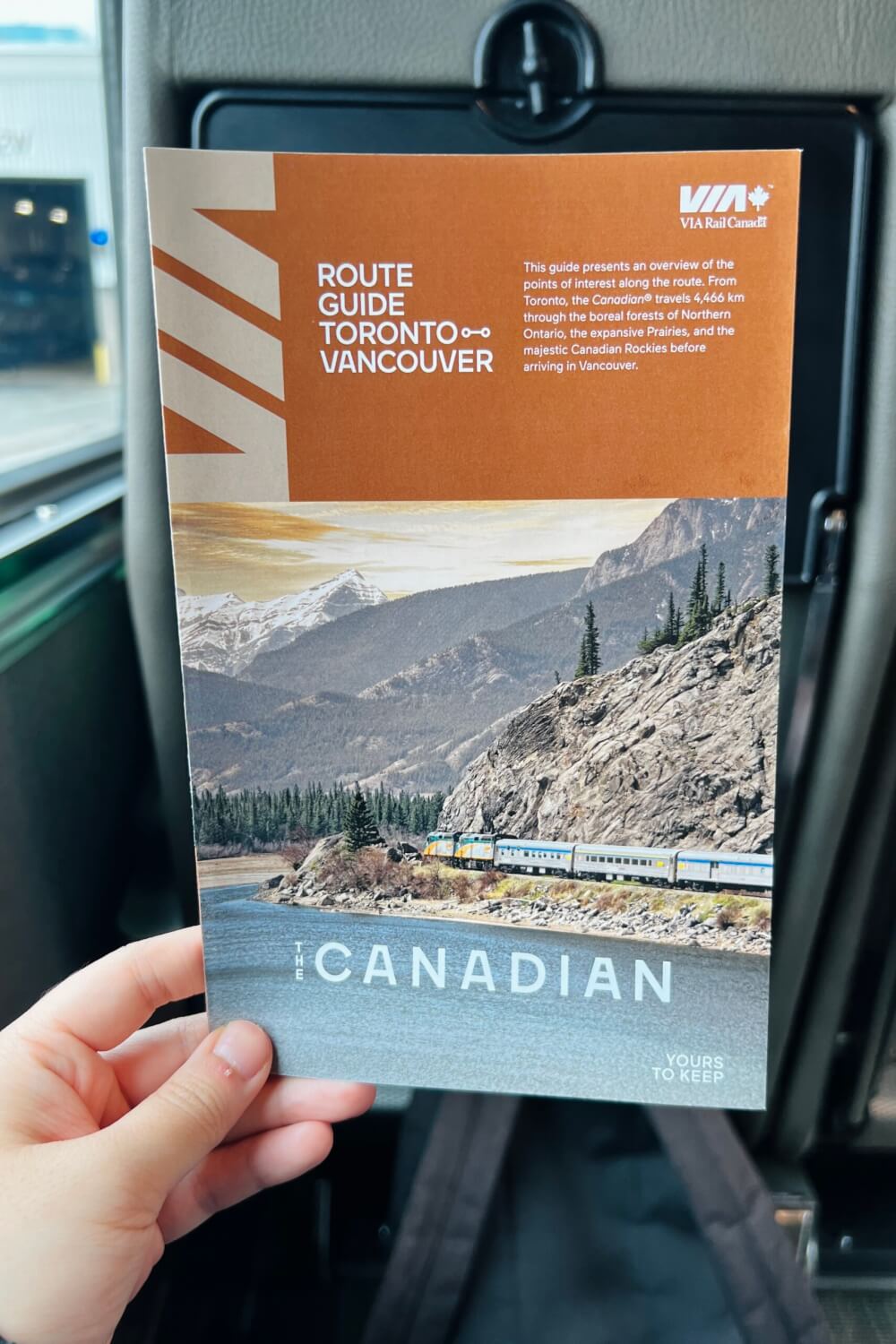
Explore the cars and don’t miss the Skyline car
I honestly think a lot of people come on board not realizing the Skyline car exists, so make sure you don’t miss it. It’s honestly dreamy up there, and a great place to sleep!
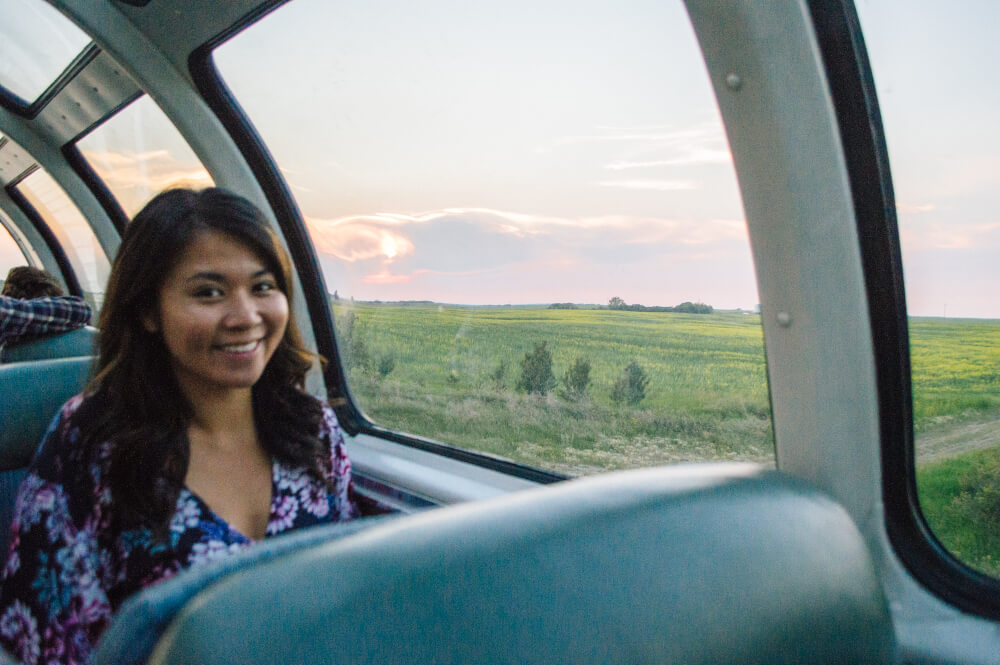
Bring some cash
While credit and debit cards were accepted on board on my most recent trip (2023), the system was still pretty old school in that they literally wrote down my name and credit card details on a sheet of paper to bill later. No contactless machines here – nope!
Obviously this was fine in the end, but if you’d prefer to not have your credit card details stored on some random piece of paper on board a train hurtling across Canada, bring some cash to pay with instead.
NOTE: They did not accept prepaid debit or credit cards during my last trip.
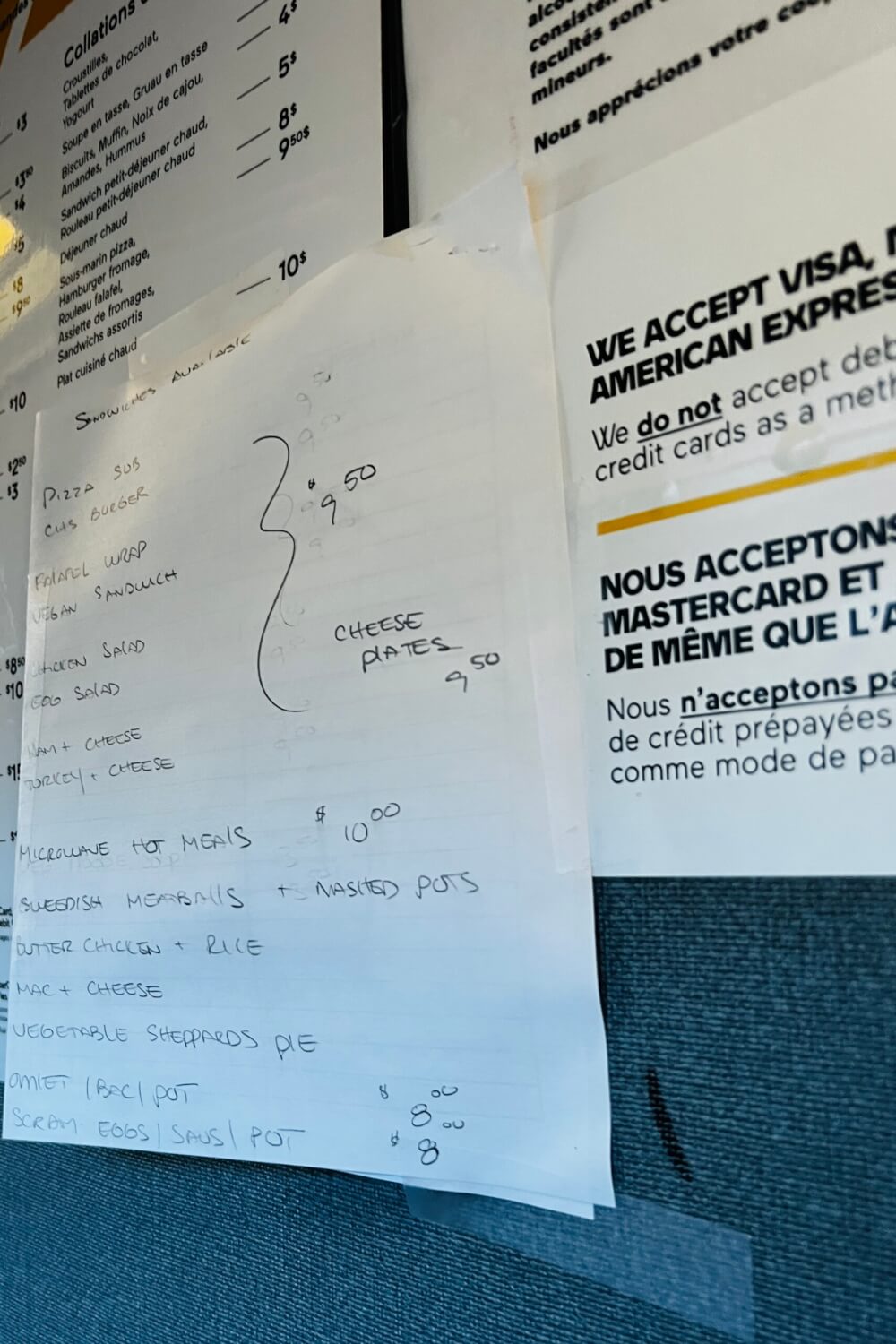
Don’t be scared to chat with other passengers and staff!
Part of what makes the train trip across Canada so special is you get a chance to meet LOTS of unique people.
I mean, anyone who chooses to take the 4 day train journey across Canada usually has some kind of interesting story to tell! So don’t be shy and make some friends 🙂
The staff on board are usually SO friendly too – many of them have been doing this for years so will have fun stories about train travel and also cool guidebooks they reference. I learned so much by chatting with staff on board, so make sure you seize the opportunity to get info out of them – they can be goldmines for knowledge.
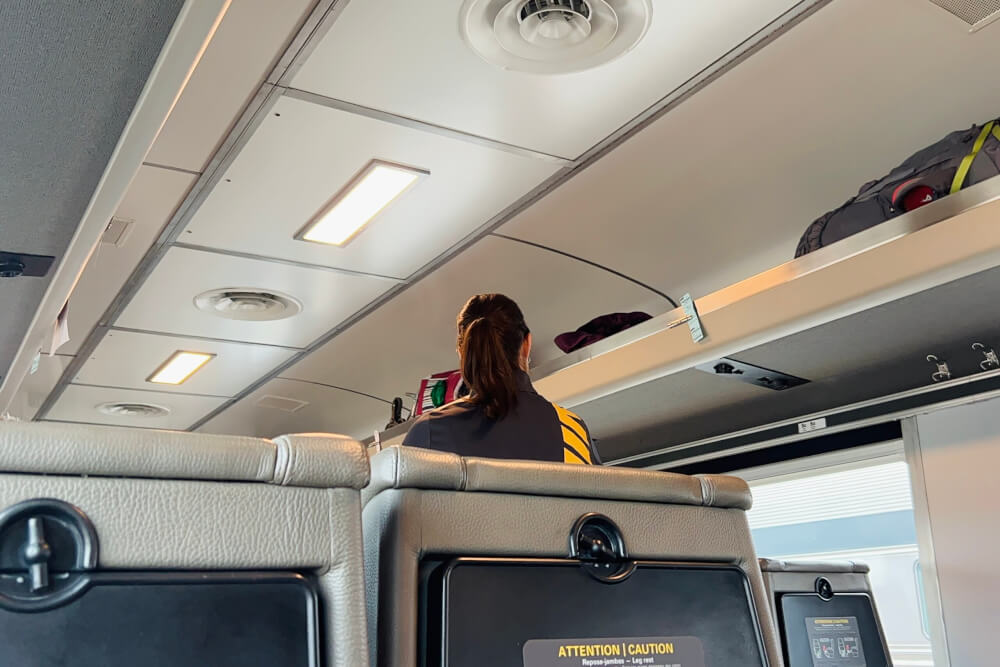
‘The Canadian’ Frequently Asked Questions
Finally, let’s tackle some Canadian FAQ!
Can I hop on and off at different cities when travelling on the Canadian?
Yes, you are able to break up your journey on the Canadian by stopping longer at the different stops, but you will need to buy separate tickets for each leg of the journey. So, if you buy a ticket from Vancouver to Toronto, you wouldn’t be able to just spend three days in Winnipeg and hop back on, you would need to book a Vancouver to Winnipeg ticket, then a Winnipeg to Toronto ticket.
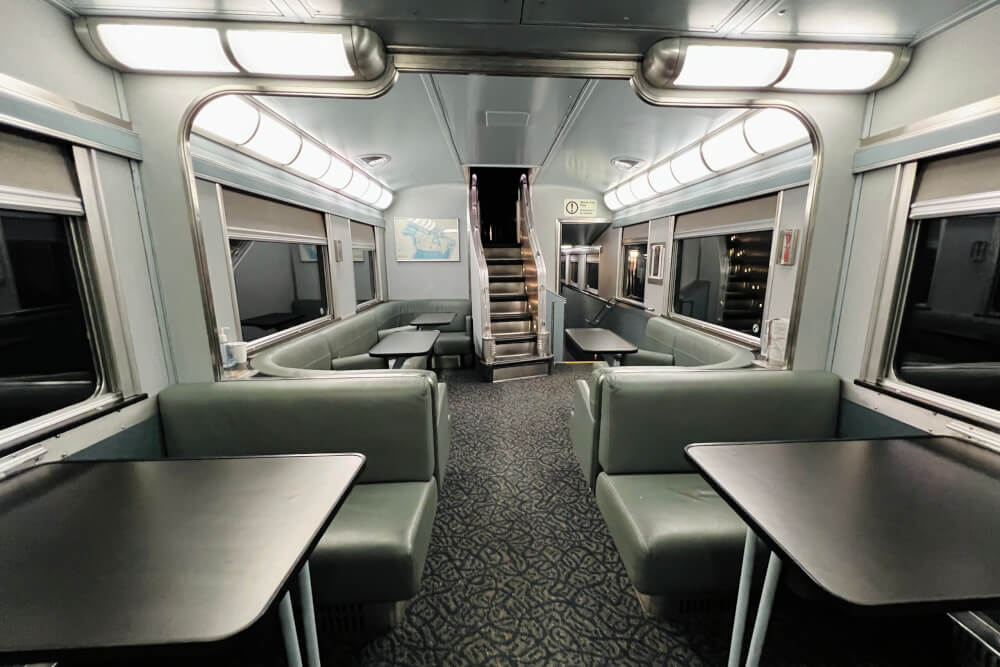
Where are suitcases and bags stored on board the Canadian?
Large bags and suitcases will be kept in a baggage car (when one is available).
Otherwise, there is some space in all classes for small carry-on size bags (in Economy, there are racks above seats, and some racks for larger bags at the end of each car).
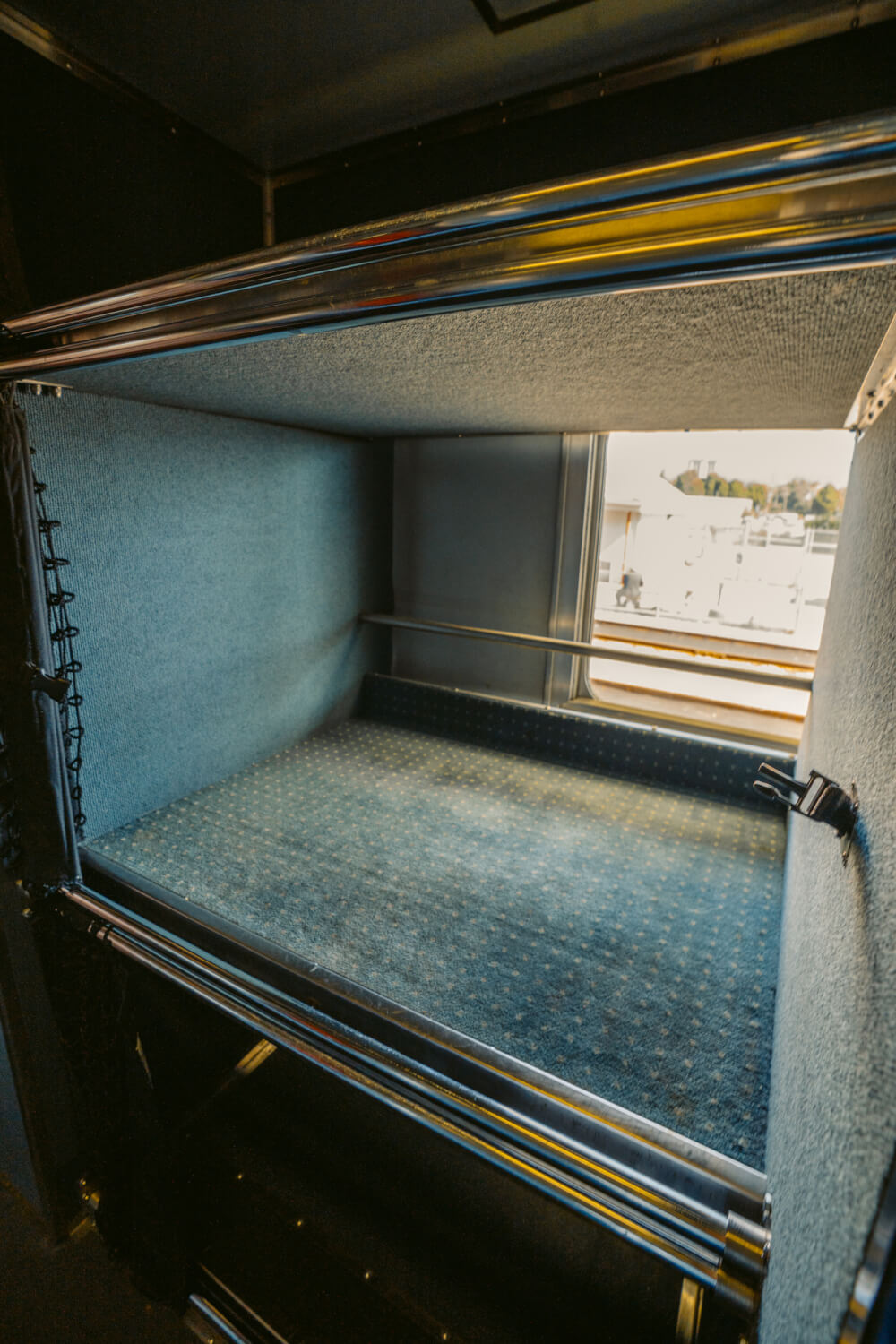
Is there any entertainment on board the Canadian?
For Sleeper Plus and Prestige Class passengers, there are some activities like wine tastings and musical performances, but there is not much entertainment on board for Economy passengers, unless you count the little info pamphlet they give you that details the trip highlights!
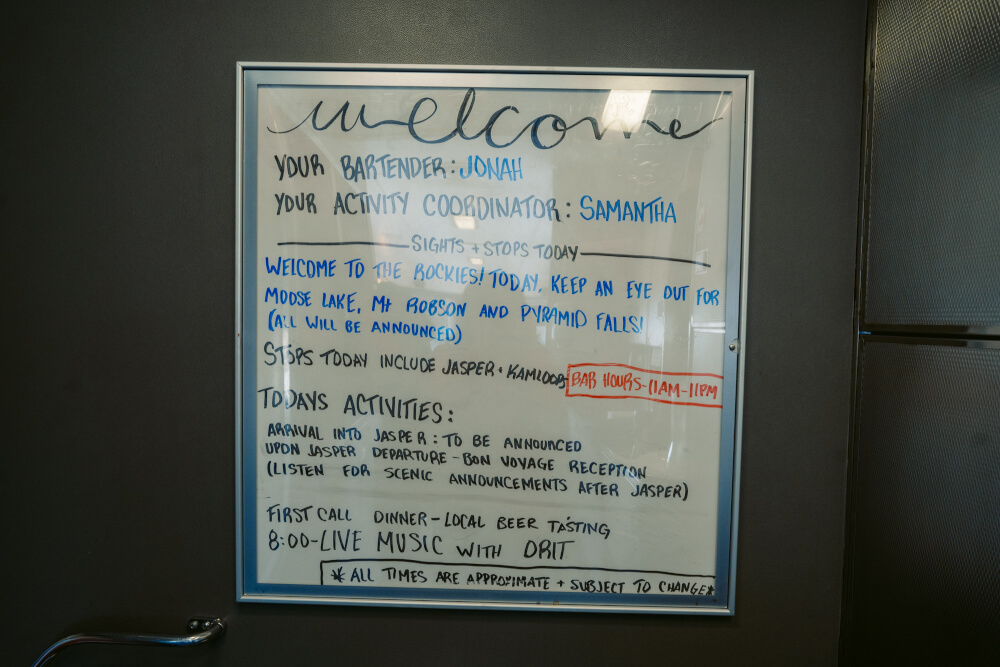
Is there food on board the Canadian?
Yes! Sleeper Plus and Prestige Class passengers get all their meals on board included in the fancy dining car.
For Economy Class passengers however, it’s a different story… you do have access to small items for an admittedly not-extortionate cost, but do know that even the ‘hot entrees’ are just microwave meals. I would definitely recommend bringing your own snacks so you have better options.
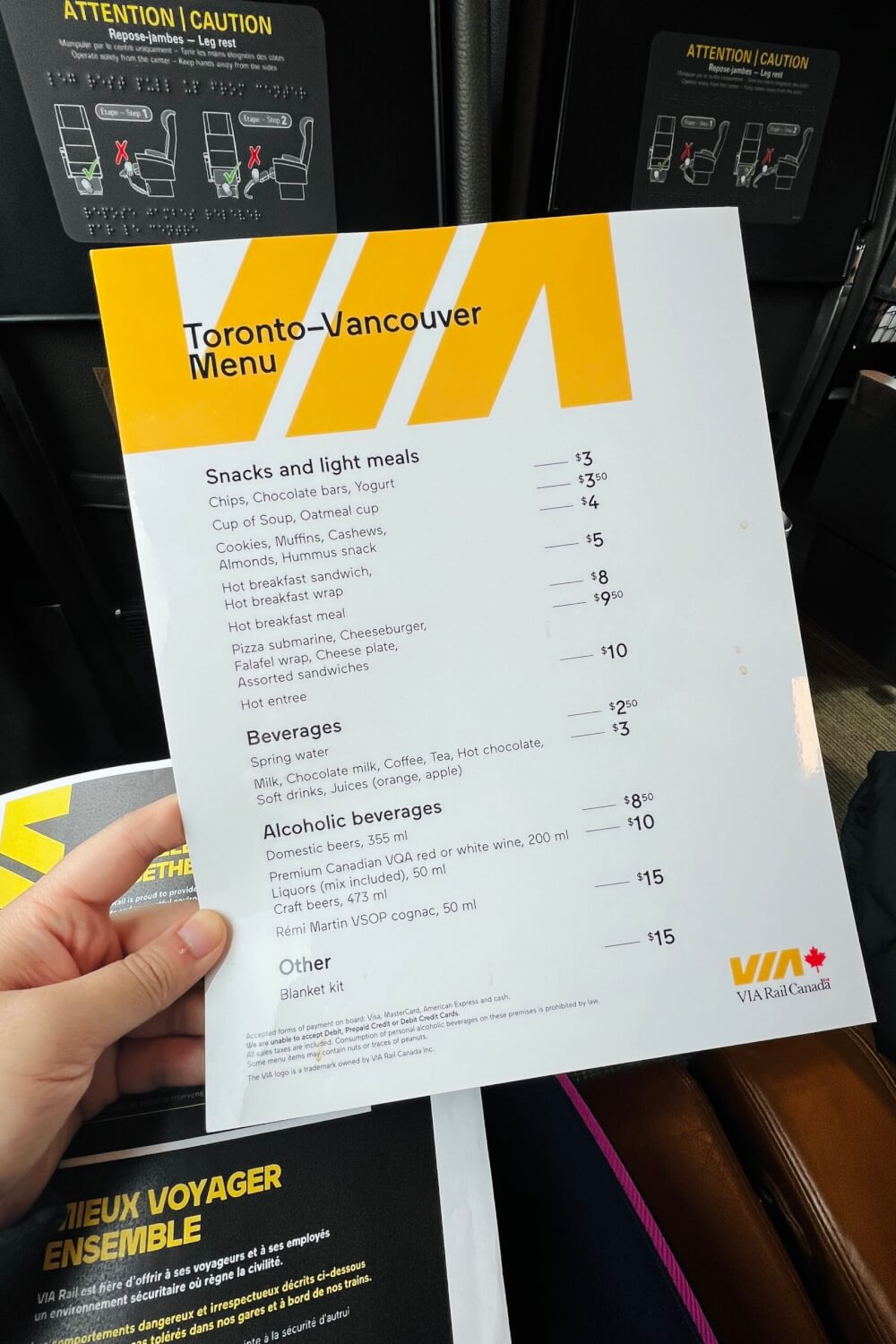
Are there showers on board the Canadian?
Yes! Sleeper Plus and Prestige Class passengers all have access to showers. For Sleeper Plus passengers this means a communal shower in each car, and for Prestige Class passengers, this means an en-suite shower.
Sadly, there are no shower facilities available for Economy Class passengers.
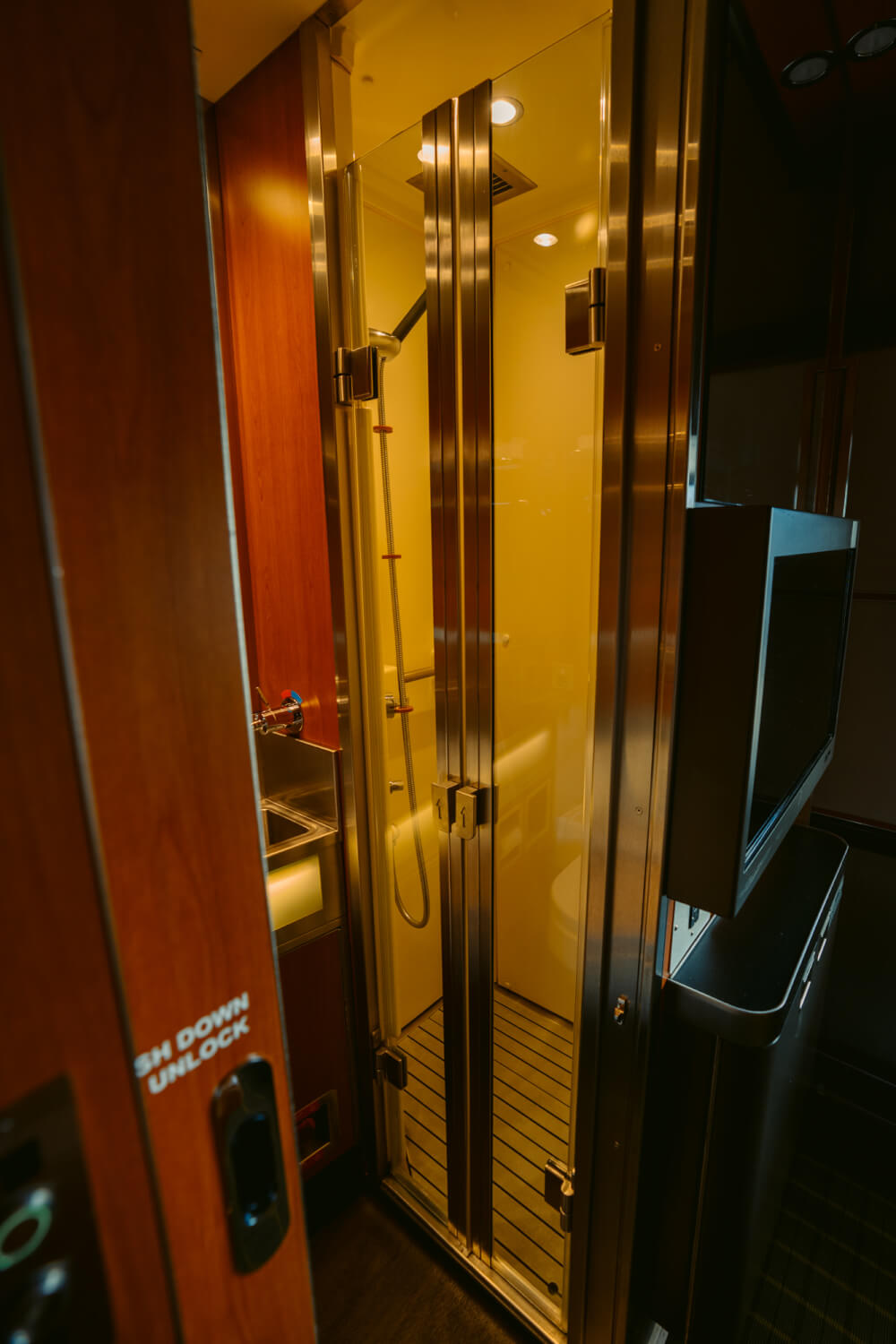
Do you have any more questions about ‘The Canadian’?
I hope you you enjoyed this thorough guide on everything you need to know about the Canadian train. If you have any more questions about the trip, let me know in the comments!

